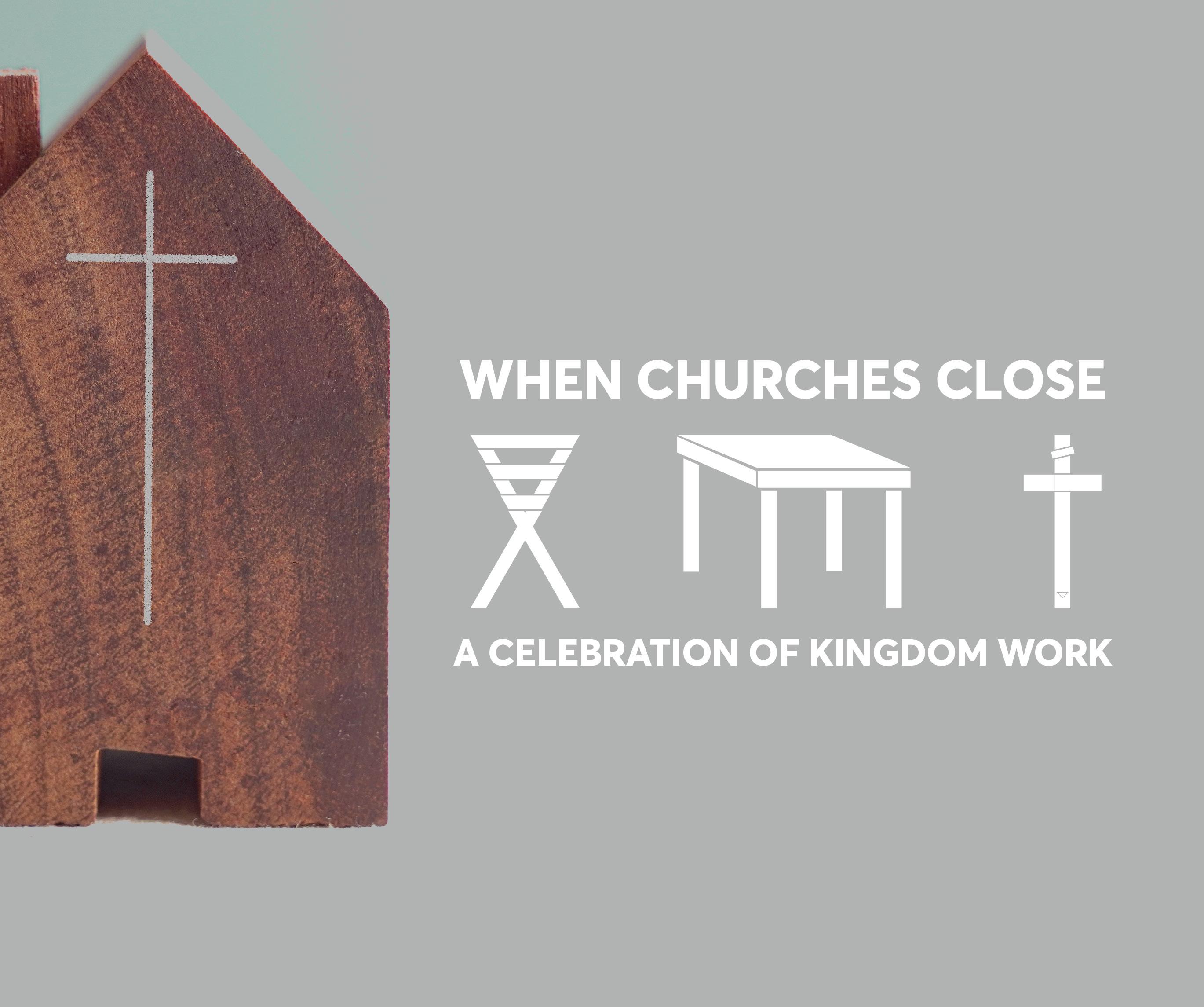
NO.
VOLUME 63,
02
COVERAGE
PROVINCIAL CONVENTION
AI
TOOLS FOR GOSPEL MINISTRY
Digest APRIL | MAY 2024 MBHERALD.COM
OPEN HANDS, OPEN DOORS
More than sixty years of sharing the life & story of the Mennonite Brethren in Canada
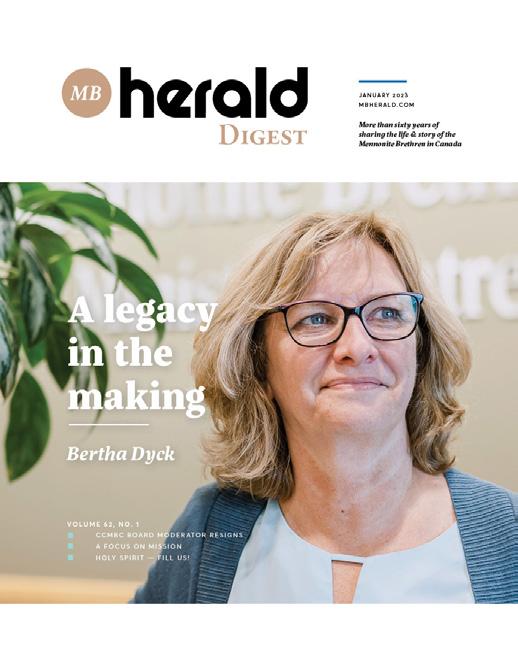
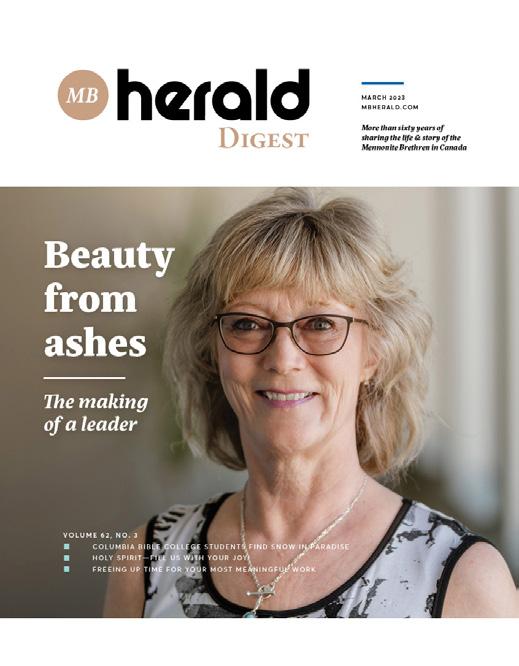
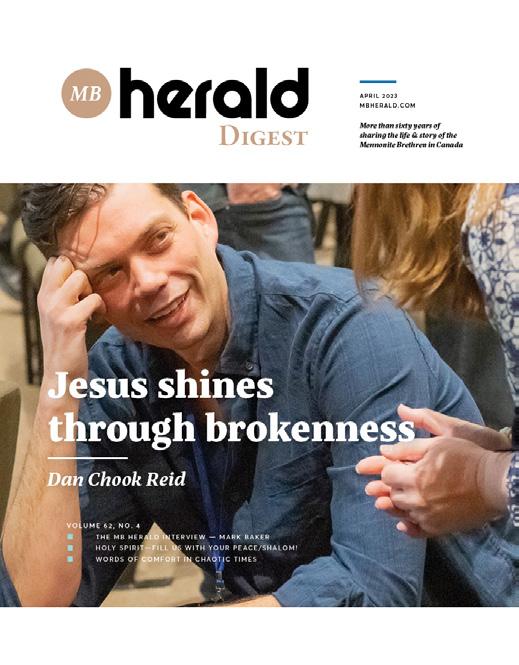
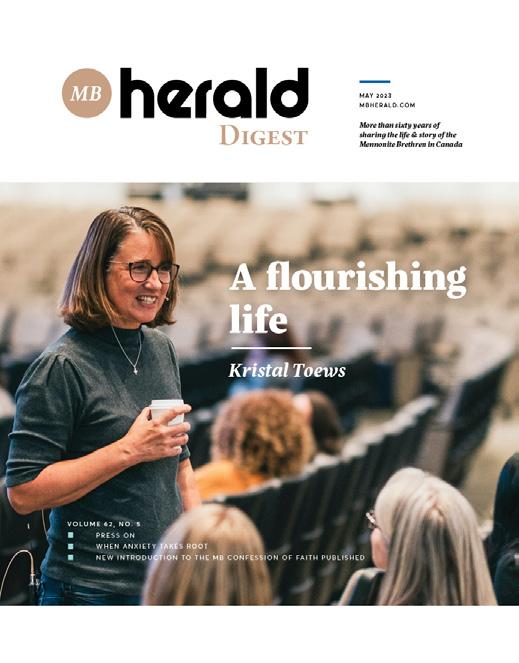

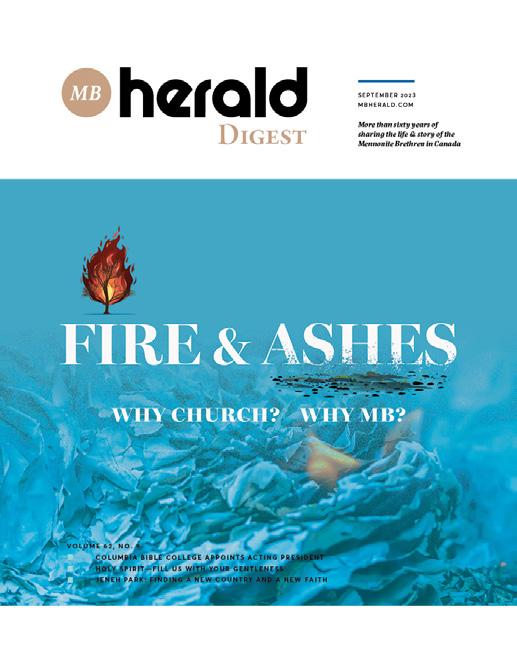
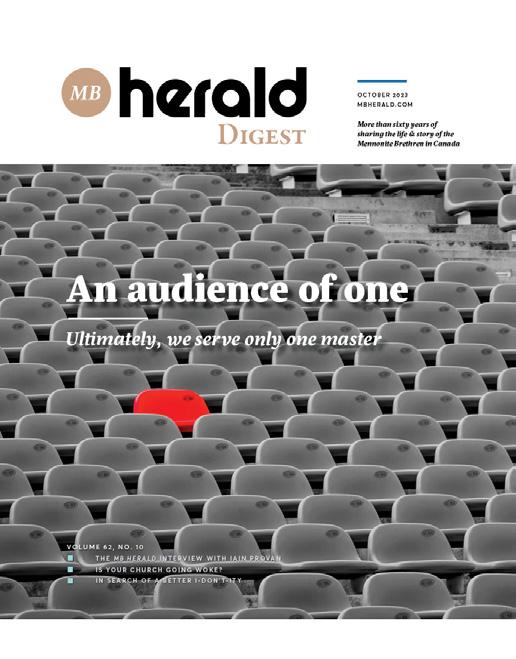
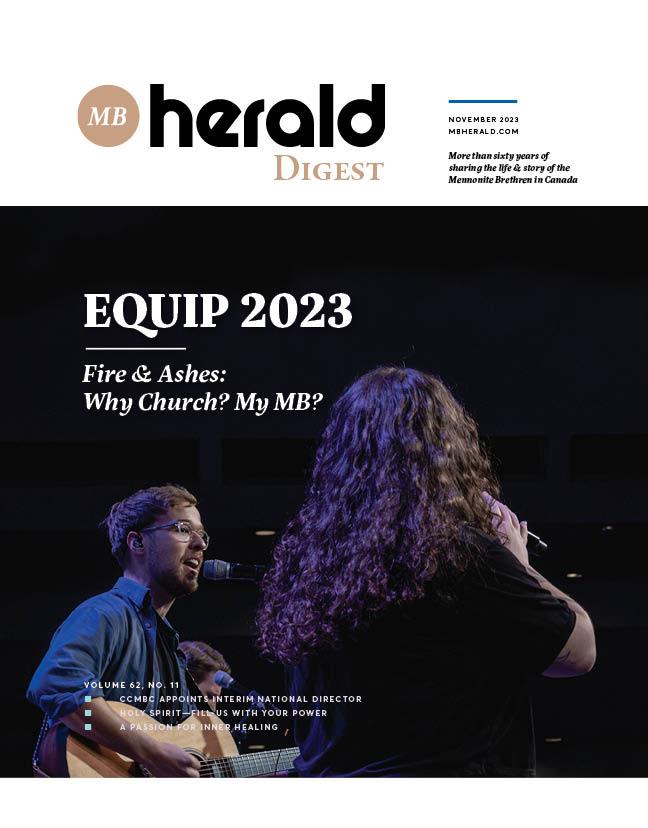
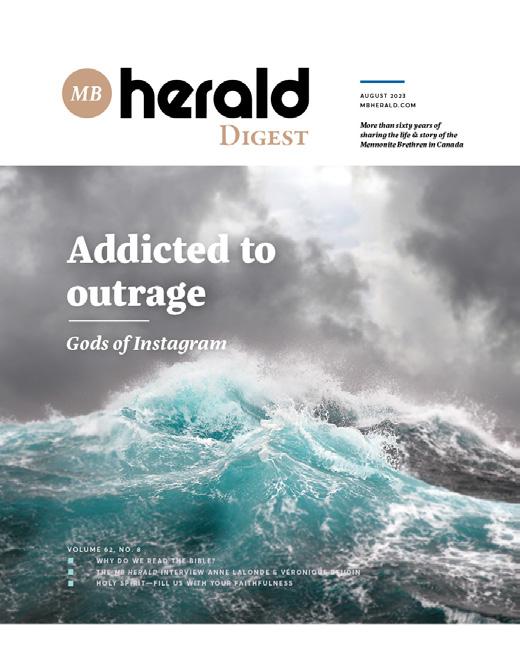
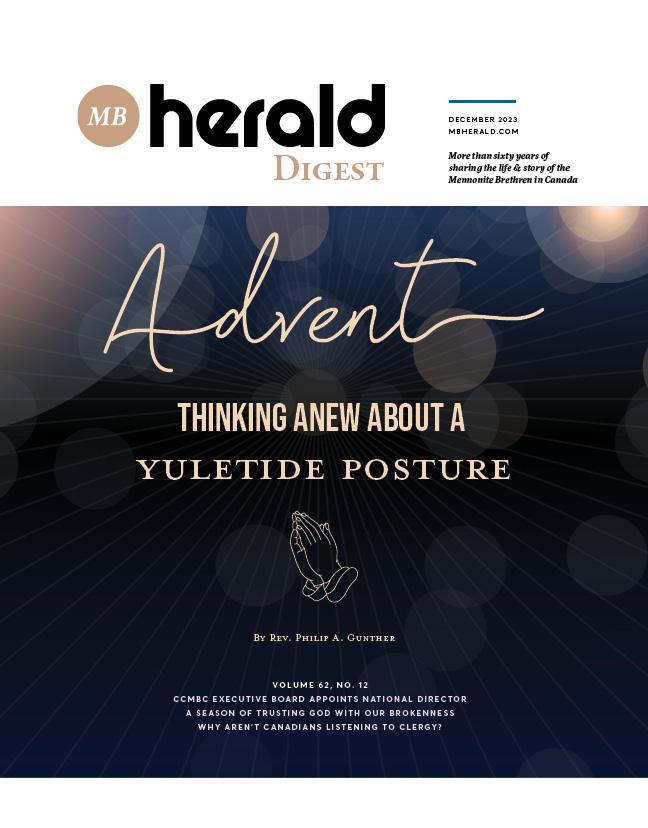
SHARE THE MB HERALD DIGEST WITH YOUR FRIENDS SIGN UP FOR THE MB HERALD DIGEST AT MBHERALD.COM/SUBSCRIBE OR CONTACT US AT (888) 669-6575 MBHERALD@MBCHURCHES.CA THINGS ARE BETTER WHEN THEY’RE SHARED
Mennonite Brethren Herald Digest is digitally published bimonthly by the Canadian Conference of Mennonite Brethren Churches, primarily for the use of its members, to build a Canadian MB community of faith. We seek to 1) share the life and story of the church by nurturing relationships among members and engaging in dialogue and reflection; 2) teach and equip for ministry by reflecting MB theology, values, and heritage, and by sharing the good news; 3) enable communication by serving conference ministries and informing our members about the church and the world. However, the opinions expressed here are not necessarily those of the church as a whole.
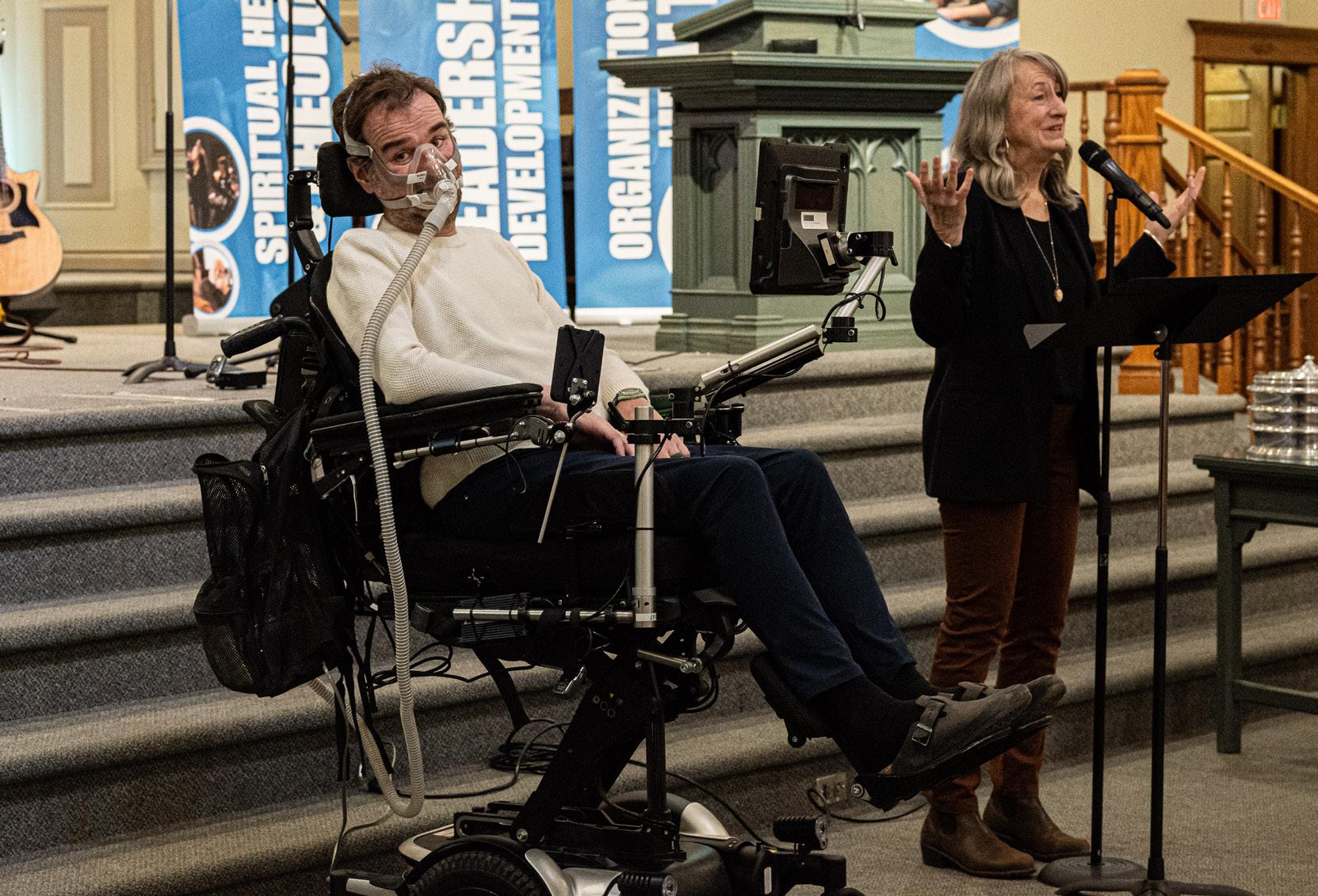
Digest
APRIL | MAY 2024 | VOLUME 63, NO. 02
EDITORIAL OFFICE
1310 Taylor Avenue
Winnipeg, Manitoba R3M 3Z6
Phone: 204-669-6575
Toll-free in Canada: 888-669-6575
MBHERALD@MBCHURCHES.CA
WWW.MBHERALD.COM
ISSN: 0025-9349
The Mennonite Brethren Herald is a publication of
Philip and Robyn Serez speak at ONMB’s annual convention at Scott Street Church. Philip says, “These last three years have been the best of my life. I will treasure this second life for as long as it lasts. I have been forced to decrease as Christ increases. I pray this second life for all.”
Read the full story on page 6
AI TOOLS FOR
CONTENDING IN PRAYER
1 MENNONITE BRETHREN HERALD APRIL | MAY 2024
10 16 24 22 A BLESSING Frieda Klippenstein OPEN HANDS, OPEN DOORS Leanne Janzen
GOSPEL
MINISTRY Mike Engbers
Ken
FACEBOOK.COM/MBHERALD TWITTER.COM/MB_HERALD SOUNDCLOUD.COM/MBHERALD MBHERALD.COM Connect
Esau
story of Mennonite
CANADIAN CONFERENCE OF MENNONITE BRETHREN CHURCHES
CANADIENNE DES ÉGLISES DES FRÈRES MENNONITES 20 26
CLOSE Philip
Gunther LIVING GENEROUSLY CCMBC Legacy Fund
Sharing the life and
Brethren in Canada
CONFÉRENCE
WHEN CHURCHES
A.
From the editor
FRIENDS REMEMBERED
My first interactions with Harold Jantz were peripheral. I was a young designer working at ChristianWeek. Harold, the newspaper’s founder, had retired from active involvement, so my understanding of who he was and what he stood for largely came from file photos and reputation. Occasionally, he would visit the ChristianWeek offices, and I’d see him chatting with editors and staff. Harold was gentle and soft-spoken, yet he delivered every word with conviction and purpose. Even from a distance, I could sense that about him.
Twenty-plus years later, I am in the MB Herald editor’s chair. I am no Harold Jantz, not even close. Still, I feel a kinship by role and lineage to him (and all past editors of the Herald). In recent years, I had precious opportunities to sit with Harold and learn from him. Most recently, I interviewed Harold for a feature story. We flipped through his books, compared notes on the role of editor, and he shared his life story. That hour spent with Harold was priceless; I wouldn’t trade it for anything.
“I’ve always been attracted to stories of people who have had struggles,” Harold said. He paraphrased New York Times writer David Brooks, noting that we are all bent wood. “The great drama of our lives is a quest for holiness. We all need redemption, and that only comes by grace.”
Harold was my mentor and friend; our shared moments were impactful, and I owe him a great debt of gratitude. He will be missed.
Tim Wiebe was an accounting clerk for CCMBC Legacy Fund. When I arrived in 2014, he’d already been here a while. It didn’t take long to see that he was a fixture around the office. But that’s not a good description of Tim. He was more like a family member. In many ways, Tim brought us together.
Tim had bad arthritis; his hands and hip would bother him often. Sitting to type could be difficult. He may have occasionally griped about data entry, but Tim never complained of the pain. He worked hard, completing tasks made harder by his ailments. Tim had a servant’s heart.
Tim kept a Mr. Bean bobblehead on his desk. He enjoyed cracking jokes and never failed to announce my entry to the staff lounge as if it were my first time there. He had a way of making each of us smile.
I remember a few days before Tim left for treatment for Hodgkin’s lymphoma, some of the guys in the office planned to take Tim out for lunch. Other staff got wind of the idea, and an impromptu all-staff farewell lunch sprang up. In no time, the entirety of 1310 Taylor Avenue crowded into the Chinese restaurant down the street, moving tables, shuffling chairs and bewildering serving staff. And the funny thing was most of us weren’t fond of the food there. But it was Tim’s favourite, so it was our favourite on that day because we loved Tim.
John and Linda, thank you for sharing Tim with us; we are better people for knowing him.
With respect,
 CARSON SAMSON Communications director
CARSON SAMSON Communications director
2 APRIL | MAY 2024 MBHERALD.COM Carson
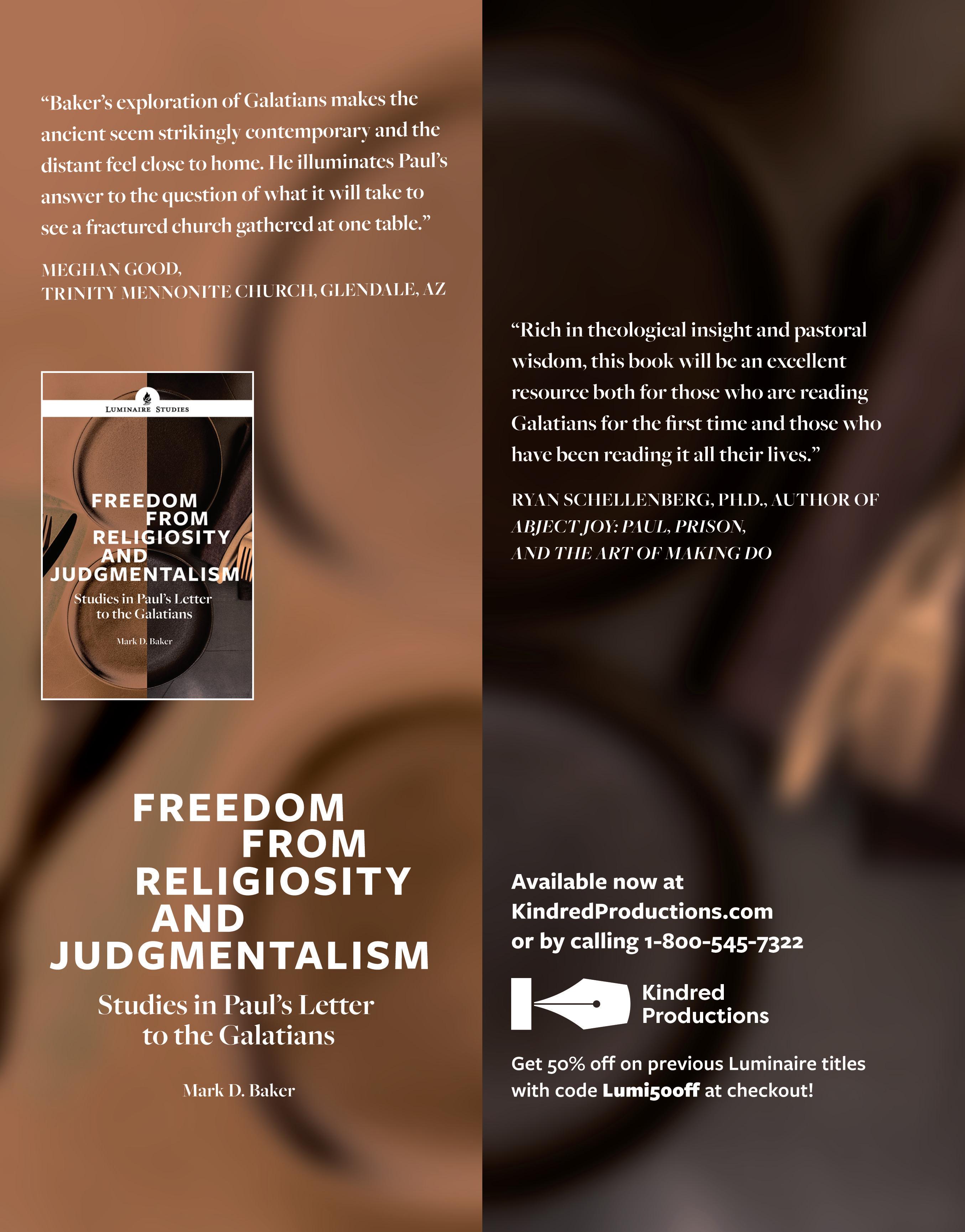

MULTIPLY SOARS INTO SPRING
SOAR KITCHENER
Youth gathered in Kitchener over the March break to participate in Multiply’s SOAR program. One participant shared what God had revealed during the four-day program: “It’s okay to be scared. We’re human. But God can transform our fear. He can give you courage and strength. All you have to do is ask.”
SOAR HEARTLAND
357 SOAR participants gathered in Winnipeg March 22-28 to learn, worship, pray and serve. One youth leader described the transformational change she saw in her students: “We saw walls break down for our youth.”
SOAR SASK
During the February break, 135 participants spent eight days together in Saskatoon learning, serving and being on mission together. Many of the participants stepped out of their comfort zones as they served, including sharing their faith with others for the first time.

MB Herald Jobs posts ministryrelated positions in the North American evangelical Anabaptist community. It’s a place where churches or other non-profit organizations can advertise vacant roles. And it’s a place to come when looking for a ministry change. Find new postings or advertise now at jobs.mbherald.com
CCMBC Legacy Fund Inc. (Legacy) is seeking a permanent, fulltime Accounting Analyst to join our team at our head office in Winnipeg. We offer competitive remuneration and a comprehensive benefits package including group health insurance and matching pension contributions.
>> Visit jobs.mbherald.com for the full posting with the role description.
CCMBC Legacy Fund is seeking a Controller to join their team at their head office in Winnipeg. Primary responsibilities include leading and overseeing the activities of the Accounting department, handling financial reporting, budgeting, and internal controls, and spearheading automation projects of the Finance department and other process enhancement initiatives.
>> Visit jobs.mbherald.com for the full posting with the role description.
>> Also visit nelsonandkraft.com for more information on this position.
4 APRIL | MAY 2024 MBHERALD.COM
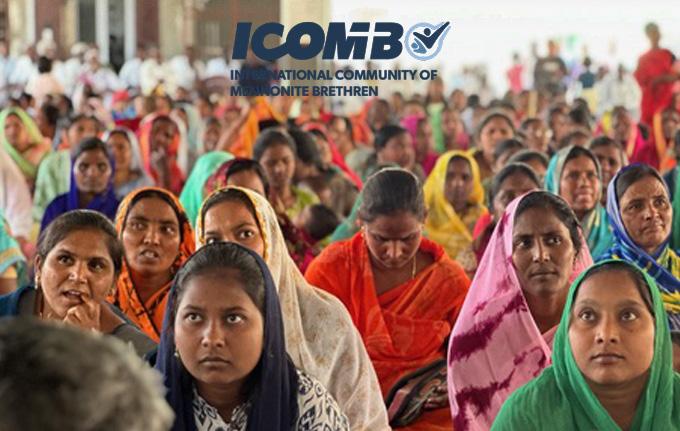
STORIES OF MISSION, SUFFERING AND FAITHFULNESS FROM THE GLOBAL CHURCH
Join ICOMB (The International Community of MB Churches) at the North Kildonan MB Church on May 3 at 7 pm for our fundraising banquet supporting ICOMB. Your attendance will help ICOMB raise funds to support its work in building and strengthening MB communities around the world. So please mark your calendars and join us on May 3 for a night of great food, great company, and a great cause!
• Sponsor a table of 8 for $250
• Donations will be accepted
• RSVP to elton@icomb.org by April 19
Special guest Dr. John Sankara leads a network of church planters across 12 North India and Nepal states. With a calling to ministry that started in 1984, his journey has seen him serve as a theological educator at the Mennonite Brethren Centenary Bible College in India, director of church planting initiatives with our MB conference of churches, and as a Global Disciples facilitator for that country. Amid challenging circumstances marked by increasing opposition, Dr. Sankara Rao remains faithful to an unwavering vision to reach the nation with the good news of Jesus. John’s wife, Mary, recently passed away during the COVID pandemic.
2024 PROVINCIAL ASSEMBLIES AND CONVENTIONS
ONMB Convention
February 23-24
MBCM Assembly
March 1-2
AEFMQ Convention
March 23
SKMB Assembly
March 22-23
ABMB Convention
April 12-13
BCMB Convention
April 26-27
5 MENNONITE BRETHREN HERALD APRIL | MAY 2024
CCMBC AGM JUNE 13, 2024 6 PM CENTRAL | ZOOM PCO | MAY 28-30, 2024

Being a Great News People
ONMB hosted a senior’s luncheon on Thursday, the first of its kind in many years. Seniors attended from across the Niagara region, as well as a large contingent from Scott Street Church’s neighbouring Tabor Manor.
An all-day pastors’ equipping day took place on Friday, with guest speaker Carolyn Klassen of Wired for Connection (Winnipeg) leading the assembled leaders through conversation and exercises exploring how to lead in ways that stay far away from the violation of power and from spiritual abuse. “Healthy Leaders: Addressing Pastor Vulnerability and Power Dynamics,” was introduced as part of the Pastors Credentialing Orientation curriculum in 2023.
Concerning Friday’s workshop, Connie Maier (Glencairn MB Church in Kitchener) said, “Exploring our weak and vulnerable places is a great first step for pastors. We must be on the lookout for patterns and mindful of where they may lead.”
Friday’s public worship was highlighted by Robyn and Philip Serez’s testimony of faith in the shadow of Philip’s tremendous battle with ALS and punctuated by new ONMB provincial director Trevor Seath’s address.
Diagnosed in November 2020 with an incurable illness, Philip Serez could have withdrawn from
ministry, but instead, Philip entered a second life of mission. Through the help of ocular-assisted technology, he proclaimed to those gathered at Scott Street, to be born again—again. “The second life is where we trust Jesus instead of blaming him,” Philip says. “These last three years have been the best of my life. I will treasure this second life for as long as it lasts. I have been forced to decrease as Christ increases. I pray this second life for all.”
The worship team led the congregation in singing “Take My Life and Let it Be,” a reflection of the faithful service Robyn and Philip continue to uphold. “Faith is not mustered,” says Robyn, “It is nurtured. When the ship sinks, the hymn on my heart will be ‘It is Well With My Soul.’”
In his closing address, Trevor Seath challenged Ontario churches to be on mission: “I long to see MBs living in intimate discipleship to Jesus Christ. Our world deeply needs our churches to be transformed by the gospel.”
Seath was commissioned as ONMB’s Executive Director the next day as part of the provincial annual general meeting. ONMB staff Kristi Lee and Ryan Jantzi were recognized for their exceptional work. Of Jantzi, who served as Interim Executive Director, board chair Michelle Knowles said, “You have taken a season of great struggle and nurtured a deep relational connection with our family.” Knowles referred to Lee as “The heartbeat of ONMB.”
Live episodes of “Jesus Stories,” ONMB’s podcast were peppered throughout the days business portions: reminders that MBs are indeed great news people, defined not by who they are, but by what God has accomplished.
MB Herald staff
6 APRIL | MAY 2024 MBHERALD.COM
2024 ONMB CONVENTION SUMMARY
ONMB executive and search team commission incoming ONMB provincial director Trevor Seath.

Steadfastness in light of many changes
Manitoba churches met at Fort Garry MB Church in Winnipeg on March 1 and 2, 2024.
Steeped in the book of John, MBCM had three main objectives for Assembly: faith in Christ strengthened; love for Jesus deepened; Christ-followers equipped to share Jesus.
The special guest for the Assembly was Nasser al’Qahtani, a member of Multiply’s Global Lead Team and Regional Team Leader for North Africa and the Middle East. Al’Qhtani delivered three keynotes from John chapters 1 and 13 with an insider’s perspective on Middle Eastern written and oral traditions.
“Leave today reignited in your love for the Word— the foundation. We are invited into God’s story and invited to share it with the world,” said al’Qahtani at the onset of his Friday lecture.
Manitoba MB pastors and church leaders participated in an equipping day on Friday, followed by worship, conference business, reporting and workshops on Saturday. Learning sessions on various topics were presented, including the 1999 Confession of Faith (Ken Esau), Keeping Your Credentials (Jason Dyck and Mark Wessner), and Open Hearts, Open Hands: A framework
for including ALL people in our faith community (Johnny Dodsworth).
Meeting for the second time in 2024 as an assembled body of congregations, Moderator Dave Ens acknowledged the challenges faced in recent years: “Living together in harmony is not always easy. I am praying that God grants us the steadfastness we need.”
MBCM Provincial Director Cam Priebe announced his resignation. “I am incredibly grateful for the opportunity to lead these past five years,” said Priebe. His tenure will end following the Manitoba pastor’s retreat in May.
Among the slate of board and committee nominees was Terry Dueck of Winkler, MB. Dueck was appointed as Board Moderator, serving a single-year term until March 2025. Dueck has nine years of experience with the MBCM board.
MBCM reported a strong fiscal positioning, with an unexpected surplus credited to increased church giving and other one-time gifts.
MB Herald staff
MBCM director of ministries, Jason Dyck leads Assembly guests and delegates in communion at Fort Garry MB Church (Winnipeg).
2024 MBCM ASSEMBLY SUMMARY
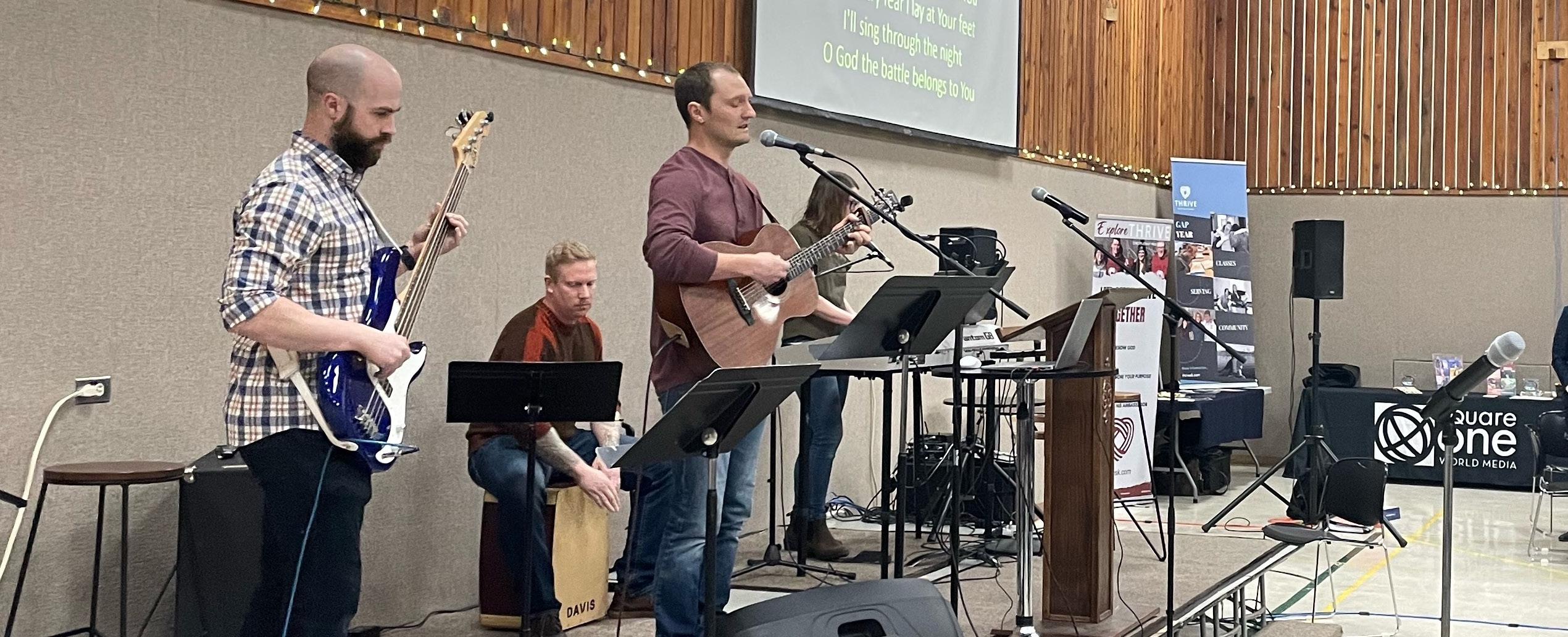
Move! Called to Act, Called to Mission
Saskatchewan churches met on March 22 and 23 at Bridgeway Community Church in Swift Current, SK. The event was co-hosted by Grace Community Church in Herbert, SK. The challenge woven throughout the weekend was the call to be people of action: to step out of safety and humbly submit to the Holy Spirit, following where he leads.
ABMB Executive Director Paul Loewen in his Friday afternoon keynote “The Faithful Walk” used the story of Noah to illustrate four components of a faithful walk with God: teaching the next generation, being counter-cultural, sharing the Good News with others and having a posture of worship. “People won’t remember all the things you did,” said Loewen. “People will remember your walk with God.”
Reports from ministry partners were presented on Friday afternoon. Attendees also attended workshops on Friday and Saturday. Topics included: MB Confession—Relevant in 2024? (Ken Esau), The Church and Spiritual Abuse (Tony Martens), Church Revitalization (Luke Etelamaki), Leadership Resilience [on Zoom] (Heather Tomes) and AI and The Church (Mike Engbers).
Friday evening, Mike Engbers (Lead Pastor at Parliament Community Church in Regina, SK) spoke on “The Transformational Walk.” Using Exodus 13-14, he shared how the unexpected moments in our lives — those positive and negative detours — are essential to our spiritual growth.
On Friday evening, attendees heard updates from ICOMB, CCMBC and SKMB. Executive Director of SKMB
Phil Gunther stated his optimism going into 2024: “Our churches are united in conviction. We are not in conflict theologically. Yes, we have nuances, but we offer grace to each other. Thank God!” He noted only two churches in the province are searching for pastors, and Saskatchewan will be sending a dozen new pastors and directors to be credentialed at the PCO in May. SKMB and the Alberta MB conference continue to evolve in their ministry partnership. They held a joint African church leader congress in 2023 and will again jointly host a pastor retreat in 2024. Gunther also acknowledged the grief present among the SKMB family; two pastors tragically lost loved ones this past year, and two churches have closed their doors.
The final keynote on Saturday morning was from Darren Kennedy, Lead Pastor at Bridgeway Community Church in Swift Current, SK. Using Joshua 6-7, he urged those in attendance to lead as Joshua did, with God at the centre of his people. Kennedy shared how, in the last three years, his church has been on a journey of renewal through humility, repentance and submission to the Holy Spirit.
The Executive Board reported a strong financial standing, and the 2024 budget was approved. Delegates voted in favour of Gord Schroeder to continue as Board Moderator for another two-year term, in addition to David Foth serving another two-year term on the Executive Board as Treasurer.
MB Herald staff
2024 SKMB ASSEMBLY SUMMARY
8 APRIL | MAY 2024 MBHERALD.COM

MCC shipment of food crosses border into Gaza
With famine imminent in Gaza, MCC has delivered a critical truckload of emergency food for besieged families. As part of a convoy of other trucks transporting humanitarian relief via Jordan, the vehicle sat for more than a week waiting to cross the border but finally made its way through the Kerem Abu Salem crossing into Gaza on March 19.
MCC partner Al-Najd Developmental Forum (Al-Najd) received the lifesaving delivery from the first of six planned truckloads, including locally purchased food such as chickpeas, lentils, rice, flour, cooking oil, canned meat, fish and beans. The packages will be delivered to 665 displaced families currently living in tent camps in Deir al Balah and other locations between Gaza City and Rafah, known as the “Middle Area” of the Gaza Strip. It’s harder for families living in the Middle Area to access humanitarian relief than it is for those who fled further south.
“The process for getting the goods into Gaza has been full of ups and downs,” says Sarah Funkhouser,
MCC representative for Jordan, Palestine and Israel along with her husband Seth Malone. “We’ve been blessed to work with a great partner in Jordan, but the restrictions imposed by the Israeli authorities have caused delays that have been difficult to work around.”
After weeks of unsuccessfully navigating complicated logistics to bring a shipment of food through the Rafah crossing into Gaza through Egypt, MCC was able to connect with a partner in Jordan to bring food supplies through the Kerem Abu Salem crossing instead. Once the supplies were purchased in Jordan, MCC staff from the Jordan, Palestine and Israel team inspected the items and hand-packed the food into boxes for distribution.
It was a meaningful and tangible way for MCC staff to engage, after working so hard to coordinate and overcome numerous obstacles. While they couldn’t cross the border themselves, the staff knew the packages would carry love to families in need.
“As a Palestinian, I was happy to
An MCC staff* observes workers packing emergency food packages in Amman, Jordan, to be dispatched to Gaza as part of an initial pilot shipment of 665 food packages.
(MCC PHOTO/MARC FALCONER)
help check and pack food boxes for our sisters and brothers in Gaza, knowing that every item in the box we picked together is greatly needed,” says an MCC staff* who helped pack the food packages. “Every day we pray for justice and peace and for equal human rights and dignity.”
But once the packages were assembled, it still wasn’t a straightforward journey across the border. Intense restrictions by the Israeli government on supplies going into Gaza meant there have been significant delays at the border. The convoluted and time-intensive inspections have led to a long queue of trucks waiting to cross. Due to seemingly arbitrary decisions by the Israeli authorities, many transport trucks carrying life-saving supplies have been turned away at the crossings, unable to unload their shipments. MCC’s shipment of muchneeded food packages sat in a warehouse for three weeks until it was cleared to enter the long line of trucks waiting to cross into Gaza.
When the truck finally made it across the border, Al-Najd staff had only a few hours to unload the supplies from the transport truck into smaller vehicles. Those vehicles would then bring the packages the rest of the way to families in dire need in the Middle Area.
*Some names have been withheld for security purposes. >> Full story at
9 MENNONITE BRETHREN HERALD APRIL | MAY 2024
>> FROM MBHERALD.COM
mbherald.com
TOOLS FOR GOSPEL MINISTRY THE CHURCH AND AI:
BY MIKE ENGBERS
THIS IS THE THIRD AND FINAL ARTICLE IN OUR SERIES EXPLORING ARTIFICIAL INTELLIGENCE AND THE CHURCH. IF YOU MISSED READING THE PREVIOUS TWO ARTICLES, HERE ARE PARTS ONE AND TWO
n the previous two articles, we’ve explored a theology of technology and reflected on five questions we should ask ourselves about artificial intelligence (AI). A larger question remains: can AI help us fulfill our call to gospel ministry as pastors, leaders and churches? The answer is a conditional yes.
IAI is an incredible tool, but it is not the only tool we have available. Whether we use AI will depend on our gifts, skills and interests. Depending on the individual and the congregation, AI may be an aid that will enhance gospel ministry, while others may be effective already and AI would serve as a distraction. There is also the possibility that ministry leaders will avoid AI for various reasons, intentionally not using it, even if it could broaden or enhance their gospel ministry.
For the purposes of this article, unless otherwise mentioned, all AI used is through the ChatGPT interface (www.chatgpt.com). ChatGPT uses text prompts to generate content. The more detailed and specific you are in your request, the better the result. To learn more about shaping your prompts, explore AI Prompt Engineering online.
What follows are a number of areas where we may see potential benefit from using AI—while not compromising creativity or reliance on the Holy Spirit. Here are five areas where AI may be useful in ministry.
1) BRAINSTORMING AND DRAFTING
AI has a wonderful ability to generate ideas when prompted. Whether sermon series, prayers, sermon outlines, letters, or social media posts, AI can create a starting point to work with.
Whenever I draft a sermon series, I often research what other pastors have done on the topic or passage. I have now added AI to my research process; I will ask AI to draft two or three sermon series from a specific text or book of the Bible over a set duration. I ask it to provide titles, scripture references and a short outline. My goal is not to use the AI content, but to allow that generated content to stimulate my creativity and help me put my mind in the context of the task at hand. Along the way, I may refer to what AI generated and see if there is anything fitting. The key to using AI for brainstorming and drafting is to use it as a catalyst— not as a finished product.
2) SUMMARIZING
ChatGPT does an incredible job of summarizing published books, historical events or even content you upload into ChatGPT. Using a tool called sembly.ai I have used AI to summarize meetings, as well as provide to-do lists and notes on the meeting. Lengthy emails can be easily pasted into ChatGPT and asked to be summarized.
I also use summaries in AI to do something different—I use it to summarize my sermon. I will ask AI several questions for my sermon after I have written it. (I even asked these questions for this article.)
The questions include:
1. Please provide a concise summary of my sermon
2. Please provide a 5-7 point outline of my sermon
3. Please evaluate the logical consistency of my arguments
4. Please suggest titles for PowerPoint slides with a maximum length of 15 words
Why would I summarize my own work? Because I want to know how clearly I am communicating, what points stand out and if anything is being misunderstood. This summarizing allows me to evaluate my message prior to preaching to see if there is anything that needs to be refined.
10 APRIL | MAY 2024 MBHERALD.COM
3) EDITING
Along with summarizing, I use AI to regularly edit documents, including my sermon. Considering the message we proclaim is the most important message in the world, any tool that can assist with the clarity of that message is valuable. I’ve used ChatGPT to do some editing, but rely mostly on a tool called Grammarly that has AI integration. This tool helps me communicate better in my writing. However, it’s not perfect. This is something to remember about AI—it is not intelligent, it is programmed. So as “intelligent” as it may seem, the suggested edits do not always understand the tone I wish to convey. However we use AI, we need to be discerning, understanding the results that it generates may contain errors and mistakes.
4) TRANSLATION
Translation is where AI has made the largest impact in the ministry of our community of faith. Our church has used AI to translate sermon slides into multiple languages. People in our church who do not know English have used Google Translate to understand the sermon. And now our church is implementing live simultaneous translation via AI in our Sunday services. This enables people of different languages to either read or listen to the sermon in their preferred language via their cell phones. We will also include English as a language for those who need assisted listening devices.
As a church we are intentionally limiting the translation program to the scripture reading and the sermon. We value how relationships are built as we learn to communicate, but wish to balance that with a sermon that can be understood. In our context, the ability to bridge the language barrier is such a valuable tool, and truly a gift from God. We desire for our church to reflect the eschatological people of God found in Revelation 5:9, where we see the sacrifice of Jesus is for “persons from every tribe and language and people and nation.” We want the Holy Spirit and our love for Jesus to bind us together and desire to remove language as a barrier to that.
If you are interested in live translation, the service we are using is oneaccord.ai. Please contact me for more information and how to access preferential pricing if this is of interest to you.
5) CONTENT PRESENTATION
One of my hobbies is graphic design, so my use of AI in this area is fairly limited as I express my creativity in this way already. However I want to be clear, the creativity is just as much in the content on the slide as the design. Those who are not adept at design may find AI useful in helping display and communicate their creative content.
I was recently working with a team of people to promote an upcoming event, and the graphic they described when brainstorming was very precise. I then used AI to create that image. The quality overall was good (though not perfect), but it worked for our application. There are many different tools available online for content presentation. You can use AI to create videos, images and PowerPoint slides. When it comes to visual communication, the effective display of sermon content should be a priority—it should be of high quality. Yet, few pastors have a basic understanding of design principles. Using AI for this may help accentuate our creativity in effectively communicating the gospel message.
SHOULD WE OR SHOULDN’T WE?
As AI continues to develop, people will explore and develop new ways to use AI in ministry. Some will be positive, others may be less so. Part of learning something new is trial and error.
When it comes to AI, we should continue to ask ourselves about how intentional we are, and whether AI is enhancing or detracting from our ministry and the work of the Holy Spirit in the church.
The lesson from Genesis 1-11 shows us, through the story of Noah’s ark, how we can embrace technology such as AI to give glory to God through our work. That same passage provides the caution of the tower of Babel—that technology can be used to put the focus on ourselves, not God.
We must heed these lessons as we engage with AI. We need to ask: does using AI glorify God, or ourselves? Does it remove our reliance on God? Does AI enhance our ministry without compromising our creativity? Or does using it remove the leading of the Holy Spirit?
If we can see ways for AI to glorify God, or help us live to the potential God has given us, then there is potential for its place in ministry. Where AI glorifies ourselves or takes the Holy Spirit out of the equation, breaks down community or has other negative impacts, we need to be thoughtful and intentional in choosing whether or not to use it.
Like many technologies that have come before AI, we are seeing its potential for Kingdom impact. I pray we use it for the glory of God.
MIKE ENGBERS
is the Lead Pastor at Parliament Community Church in Regina, SK. Mike completed his Doctor of Ministry at Carey Theological College in 2018 during which he explored and developed his theology of technology while helping churches be intentional and reflect on how they use technology to further their kingdom ministry.
11 MENNONITE BRETHREN HERALD APRIL | MAY 2024
Q&R corner
Q&R corner provides responses to questions that readers may have about CCMBC and its work collaborating with provincial MB conferences in areas of spiritual health and theology, leadership development, mission, and organizational health in order to achieve the overall mission: “To cultivate a community and culture of healthy disciple-making churches and ministries, faithfully joining Jesus in his mission.” If you would like to contribute a question, please send it to questions@mbchurches.ca
Please note that we will not be using your name in the MB Herald Digest in order to respect those who prefer anonymity. There may not be space to respond to every question—and sometimes we might not really have the ability or authority to respond to some questions (for example, those that relate more directly to one of our provincial MB conferences or to a local church leadership). We apologize in advance if we are unable to publish a response to your specific question.
Annihilationism: Could you explain the pros and cons of annihilationism? How is it different from universalism? Do the MBs have a position on “eternal conscious punishment”? And why has annihilationism become much more acceptable among evangelical (incl. MB) churches in recent years?
W.
Thanks, W., for your significant questions. It is probably best to begin by exploring briefly the three most common options held by Christians related to the nature of the punishment we associate with the word “hell.”
The first perspective is commonly called “eternal conscious torment” or “eternal conscious punishment.” This means that those who have rejected Christ will suffer in hell day and night for all eternity—with full awareness that they are suffering and with no opportunity to repent or change the future of their situation. The most common biblical support for this option comes from Revelation 20:10 which describes the lake of fire where the beast and the false prophet “will be tormented day and night for ever and ever.” Although it does not specifically mention people being tormented forever, it does say that people whose names are not found in the book of life will join them there. Revelation
14:10-11 describes how the beast worshipers will be “tormented with burning sulfur” and “the smoke of their torment will rise for ever and ever.”
These verses, together with references to “eternal fire” (Matt 25:41; 18:8; Jude 1:7), “eternal punishment (Matt 25:46), and worms eating and never dying and a fire that is not quenched (Mark 9:48) have provided the biblical support for this perspective. Some people also assume that since people have a soul, their soul must (like God) be “eternal” and therefore exist eternally either with God in heaven or separately from God in hell. (There is obviously some strong opposition to this argument since it seems to be based less on the biblical view of human personhood and more on Greek/Platonic thought.) Some also point to the rich man’s torment in the parable of the rich man and Lazarus (Luke 16:19-30; opponents would point out that this seems to be a picture of hades or the intermediate state
12 APRIL | MAY 2024 MBHERALD.COM SPIRITUAL HEALTH AND THEOLOGY
between death and final judgment and should not be used as evidence in this debate). Eternal conscious torment is specifically mentioned in the confessional statements of some denominational families (e.g., the Fellowship Baptist Pacific website states that the wicked will enter “into everlasting conscious suffering in Hell”; Vineyard USA mentions the “eternal conscious punishment of the wicked”).
The second option is what has normally been called “annihilationism” or “conditional mortality.” The main argument here is that, while some biblical writers employed the language of fire and torment (cf. Isa 50:11), they borrowed this language from the Old Testament where it is used emphatically and metaphorically to describe the complete and irreversible destruction of a person (Isa 33:14) or place (e.g., Edom [cf. Isaiah 34:9-10]). Even though the book of Isaiah mentions that Edom’s fire “will not be quenched night or day” and “its smoke will rise forever,” the fulfillment of these prophetic words was not about a fiery spectacle of visible everlasting flames, but about Edom becoming “desolate” and inhabited only by desert owl, screech owl, great owl, and the raven (Isa 34:10-11). If you visited Edom today, you would not see smoke still going up to the sky forever but a destroyed kingdom that never again reared its head.
Proponents of annihilationism mention that the Bible also uses the language of eternal destruction when it describes the fate of those who have rejected Christ: “They will suffer the punishment of eternal destruction, away from the presence of the Lord and from the glory of his might” (2 Thess 1:9; ESV). The words “destruction” (Matt 7:13-14) and “perish” (John 3:16) imply the absolute end of something or someone. Matthew 10:28 mentions that we should “be afraid of the One who can destroy both soul and body in hell.” Destruction is not about an eternal and ongoing tormenting in hell but about the eventual complete and irreversible annihilation of those who end up there.
There are two related but quite different versions of annihilationism. The first could be called “immediate annihilationism.” In this version, at the judgment seat of Christ, those who have rejected Jesus will experience the withdrawal of God’s life from them (viz., body, soul, mind, and spirit) and they will stop existing as persons altogether. The second version of annihilationism is probably best called “terminal punishment” (but some might prefer the title “eventual annihilationism”). The idea here is that those who have rejected Jesus will face the judgment seat of Christ where the ultimate wise and all-knowing Judge will condemn them to punishment for the period of time that
“Proponents of annihilationism mention that the Bible also uses the language of eternal destruction when it describes the fate of those who have rejected Christ: “They will suffer the punishment of eternal destruction, away from the presence of the Lord and from the glory of his might” (2 Thess 1:9; ESV).
perfectly and justly fits their sin of rejection and their unrighteous deeds. They will experience fully conscious punishment for what could be millions of years. The righteous Judge will determine this for each person. However, since the fire never goes out and the worm never dies, the destruction and the separation from God will be “eternal” in that there will be no hope of its reversal or of one’s escape from it (2 Thess 1:9; Matt 10:28). That is the point of highlighting that the fire and worm will not suddenly end prior to complete destruction. This terminal punishment is both “terminal” in that the punishment is a final and complete destruction, and “eternal” in that the destruction is absolutely permanent and irreversible.
The third option involves various versions of universalism—which commonly has meant that God will welcome all people either immediately or eventually into his eternal heavenly presence in the new creation. Some find Christian support for universalism because Romans 5 states that “just as one trespass resulted in condemnation for all people, so also one righteous act resulted in justification and life for all people” (v.18 emphasis added; cf. 1 Cor 15:22; Col 1:19-20). They assume that if all people are guilty in Adam, all people must be saved in Christ. However, the larger biblical story as represented in the teachings of Jesus (Matt 10:28; Mark 9:43), the words of Paul (Romans 10), and all of the New Testament teachings seem fundamentally incompatible with universalism in all its forms.
SPIRITUAL HEALTH AND THEOLOGY 13 MENNONITE BRETHREN HERALD APRIL | MAY 2024
”
The most enticing version of universalism for evangelicals is what I would call “by faith in Christ alone universalism.” This suggests that no one will ever be welcomed into God’s eternal presence simply because they do good things or because they have a “sincere faith” in something—but only through faith in Christ (sola fide). Because God wants “everyone to come to repentance” (2 Pet 3:9), the assumption here is that God’s love is endlessly reaching out to everyone who lacks faith in Jesus and inviting them into his joyous presence. This happens both during one’s life on earth and also after one dies (cf. 1 Pet 3:18-19; 4:6). This is commonly called post-mortem (postdeath) evangelism. Presumably, Jesus will never stop inviting all people (before and after death) to faith in him, and Jesus will even descend into hell to preach there until everyone finally responds and is reunited with God in the new creation. Some believe that this is implied in Revelation 21:25 which states that “on no day will its gates ever be shut.” The assumption of this form of universalism is that eventually all people will respond to Jesus either in this life or after—making “hell” a temporary entity that will at some point be entirely vacant of human inhabitants.
In order to answer your question about whether MBs have a “position on eternal conscious punishment,” we need to look at what Article 18 of our Confession of Faith (1999) actually states under the paragraph titled “Judgment”:
When Christ returns, He will destroy all evil powers, including the Antichrist. Satan and all those who have rejected Christ will be condemned to eternal punishment in hell, forever separated from the presence of God . Believers must appear before the judgment seat of Christ to have their lives examined and their labours rewarded. By God’s grace, they will enter into the joy of God’s eternal reign. (emphasis added)
Our 1999 Confession highlights that all of this process of judgment is in the hands of “Christ” and we can have great confidence that everything will be consistent with what we know about the loving, just, and good character of Jesus. However, our MB Confession leaves no space for universalism The language of “eternal punishment” and “forever separated from the presence of God” rules out the universal welcome of all people into God’s Kingdom and/or the eventual redemption of all people after death.
In terms of the other two options, some have read the language of “eternal punishment” to be in full and exclusive support of eternal conscious torment. However, others have argued that the language of “destroy all evil powers” and the focus on the irreversible separation from God, allows space for MBs to hold terminal punishment for example.
Our 1999 Confession highlights that all of this process of judgment is in the hands of “Christ” and we can have great confidence that everything will be consistent with what we know about the loving, just, and good character of Jesus. However, there is no space for any form of universalism within our Confession of Faith.
It is difficult to be definitive here about an “MB position” since, unlike numerous other denominational groups, none of our MB Confessions past or present (1902, 1975, or 1999) made the effort to explicitly use the language of “conscious punishment” or “conscious torment.” While it may be appropriate to call the debate between eternal conscious punishment and terminal punishment a disputable matter, our MB Confession paints a profoundly sober picture of the nature of final punishment for those who have rejected Jesus. As Tim Keller stated, while “virtually all commentators and theologians believe that the Biblical images of fire and outer darkness are metaphorical…the reality will be far worse than the image” (“The Importance of Hell” See here). Both eternal conscious torment and terminal punishment describe a reality that is the opposite of life, love, hope, and shalom. We may need to have more conversation as an MB family before I can unequivocally state whether MBs support one specific position on the topic or whether there is room for this topic being a “disputable matter.” Thank you for your excellent questions.
Blessings and Shalom in Jesus!
Ken Esau (CCMBC National Faith & Life Director)
14 APRIL | MAY 2024 MBHERALD.COM SPIRITUAL HEALTH AND THEOLOGY
“
”
More frequent and unpredictable
How climate change and flooding affect farmers in Bangladesh
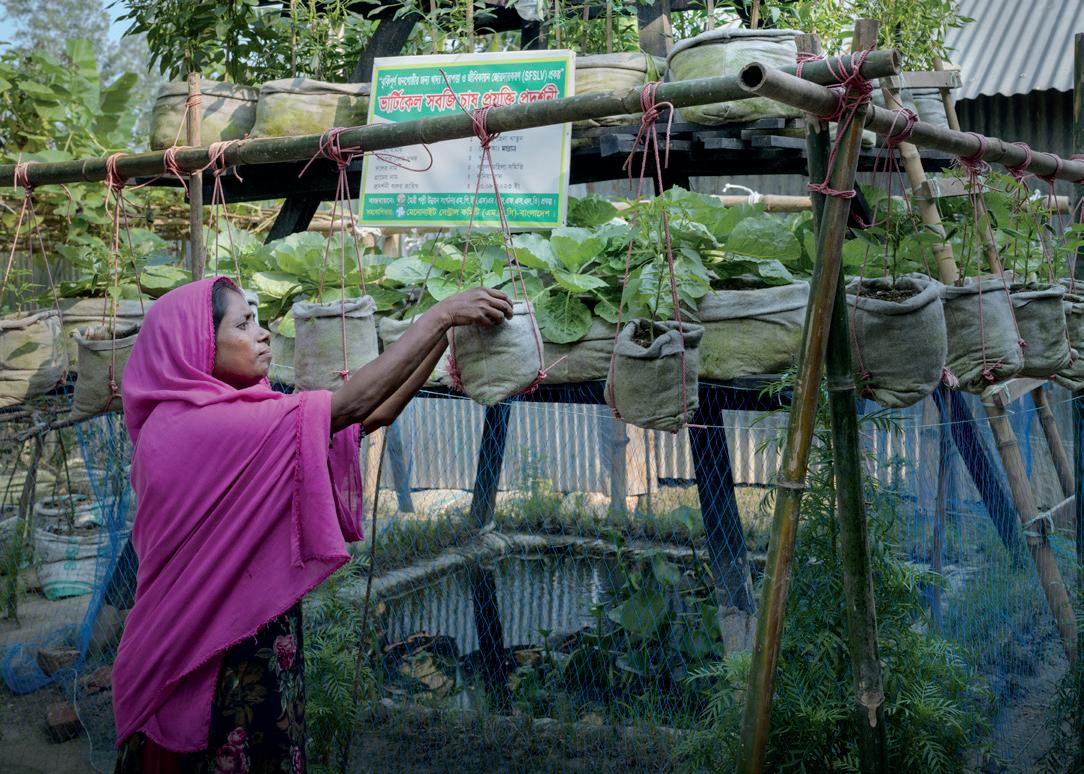 By Linda Espenshade
By Linda Espenshade
Until last summer, Hena Khatun didn’t even try to plant vegetables on her postage-stamp-size property. Every year the floodwater from the nearby Jamuna River threatened to cover the small section of land where she lives in the northwest of Bangladesh.
Unfortunately, the constant cycles of flooding aren’t going away – with climate change the rising waters are only coming more often. While these northern communities have always experienced regular flooding, as climate change continues to worsen, the floods are more frequent and longer lasting. “If you talk with the people, they will say that earlier, the flooding was one time or two times in a year, but now it is four or five times,” says Arefur Rahaman, food security and livelihoods coordinator for MCC in Bangladesh.
Alongside the flooding, farmers are also facing drought at other times of year. They used to be able to count on six distinct seasons throughout the year, but now the seasons blend together.
This means farmers increasingly don’t have enough to provide for their families, causing stress and conflict within a community. “They’re suffering, and they’re in stress for their food security,” says Rahaman. “If you are hungry, no peace will work in your mind. So, to be in peace firstly, you need food.”
MCC partners in Bangladesh are helping communities adapt to climate change. For example, one partner Maitree Palli Unnayan Sangathon (MPUS) is helping riverside residents
Check out mcc.org/climate-action-bangladesh (or scan the QR code with your phone) to see a video of a floating garden in action!
like Khatun grow food in ways that protect the plants from flooding. After learning these new techniques, Khatun has vegetables growing in sacks on an 8-foot-tall bamboo structure called a 3-D garden. Bottle gourds, a favourite ingredient in Bengali cooking, grow on vines across her bamboo canopy.
Khatun has also learned to protect her animals from the floods, the female goat she received from MPUS has a safe refuge on a raised platform inside her shed.
Another unusual technique MPUS teaches is how to make a floating garden. Made with water hyacinth, a naturally buoyant plant, the gardens will rise with the river, allowing farmers to grow crops despite the flooding.
Learning to grow food despite the challenges of climate change is critical for families living along the river says Rahaman. “Through our technologies, participants will be able to build the capacities so that they can sustain during disaster … it will make them understand that at least we have something to survive so I don’t need to make conflict with others.”
In Bangladesh, and around the world, MCC partners are helping communities adapt to climate change. But they can only do so much on their own. Learn how you can support communities like Khatun’s at ClimateActionforPeace.com.
Hena Khatun at her smart house in Bogura, Bangladesh, where she produces vegetables and has livestock with support from MCC partner MPUS. Keeping her vegetables and livestock above ground-level means they can survive the regular flooding that is becoming increasingly common due to climate change. (MCC/Fairpicture photo/Fabeha Monir)
PROMOTIONAL SUPPLEMENT
2024 MONTHLY PRAYER FOCUS
Confession Prayer
“Lord, the great and awesome God, who keeps his covenant of love with those who love him and keep his commandments, we have sinned and done wrong. We have been wicked and have rebelled; we have turned away from your commands and laws. We have not listened to your servants the prophets, who spoke in your name to our kings, our princes and our ancestors, and to all the people of the land.” (Dan 9:4-6)
“Blessed is the one whose transgressions are forgiven, whose sins are covered. Blessed is the one whose sin the LORD does not count against them and in whose spirit is no deceit…. Then I acknowledged my sin to you and did not cover up my iniquity. I said, ‘I will confess my transgressions to the LORD.’ And you forgave the guilt of my sin.” (Ps 32:1-2,5)
“If we confess our sins, he is faithful and just and will forgive us our sins and purify us from all unrighteousness.” (1 John 1:9)
“Let us then approach God’s throne of grace with confidence, so that we may receive mercy and find grace to help us in our time of need.” (Heb 4:16)
REFLECTIONS:
Our April 2024 Contending in Prayer Guide is focused on Confession Prayer where we honestly acknowledge our sin before “God’s throne of grace” (Heb 4:16) and then welcome the forgiveness and freedom that God promises us (cf. 1 John 1:9). It is not popular today to highlight our sin at all and our need for forgiveness, but this is a central element in biblical faith. We might prefer positive messages about how loved and valuable we are (which are certainly true), but there is no moving forward into freedom and full life without first confessing our sin and brokenness.
Confession prayer may seem difficult or even unnecessary for Christians who have been walking with Jesus for many years. What exactly is there to confess? While we most often define “sin” as a list of bad behaviours that we should avoid or a list of good behaviours that we need to do, sin is much deeper
than this and revolves around our heart posture. Some have said that sin is ultimately the failure to worship the Triune God and instead to orient our lives toward ourselves (or some other idolatrous passion). It is this fundamental sin that leads us to sinful actions where we fail to image God (or represent God) properly in the world and we embrace behaviours that work against God’s shalom (or life-giving) purposes for humans and creation.
Sinful actions are like cancer cells that have spread but are not the ground zero tumour. Individual sinful actions (cf. Gal 5:19-21) are not the totality of sin but simply symptoms of our deeper sinful heart posture. Confession prayer should begin with the deep sin that we discover at our core and asking God for forgiveness, cleansing, and healing there. Confession prayer moves on to confess the sinful actions that come out of that core.
APRIL CONTENDING IN PRAYER
16 APRIL | MAY 2024 MBHERALD.COM
It is sometimes difficult to believe that confession prayer really makes any difference at all. It is often a challenge to believe, deep down in the centre of our being, that sin has been forgiven and that we have been cleansed—but without this belief, we will continue to live in bondage to that sin. In the history of some church groups, it was common for the congregation to speak out words of truth in response to confession of sin (viz. “In the name of Jesus, your sins are forgiven”) so that this reality would be heard out loud and embraced.
Sin, like cancer, often has ripple effects that negatively affect other people, creation, and one’s own self. While receiving forgiveness from God is a central first step, forgiveness and cleansing from all unrighteousness may involve follow-up steps where we seek to make things right (e.g., asking forgiveness from others, repaying for stolen things, embracing acts of compassion/kindness that we chose not to do, etc.).
Confession prayer makes us face the truth about ourselves, and our need for the ongoing forgiveness and healing that only Jesus brings. It also leads us in the direction of shalom with God, others, creation, and ourselves. Confession prayer is Kingdom prayer!
CONSIDER:
˚ As you examine yourself, in what ways have you failed to worship the Triune God and made some other passion or affection the goal of your life?
˚ As you examine yourself, what specific behaviours do you want to confess in your life that are in conflict with God’s calling in your life?
˚ Are there any restorative actions the Holy Spirit is calling you to as a result of being forgiven?
CONFESSION PRAYER: PRAYING IN THE PATTERN OF PSALM 51
Psalm 51 provides us an encouraging example of confession prayer. Read this psalm out loud and then add your personal confession prayer at the end.
Have mercy on me, O God, according to your unfailing love; according to your great compassion blot out my transgressions. Wash away all my iniquity
and cleanse me from my sin.
For I know my transgressions, and my sin is always before me.
Cleanse me with hyssop, and I will be clean; wash me, and I will be whiter than snow. Let me hear joy and gladness;
let the bones you have crushed rejoice. Hide your face from my sins
and blot out all my iniquity.
Create in me a pure heart, O God, and renew a steadfast spirit within me. Do not cast me from your presence or take your Holy Spirit from me. Restore to me the joy of your salvation
and grant me a willing spirit, to sustain me. My sacrifice, O God, is a broken spirit; a broken and contrite heart you, God, will not despise.
Express thanks to God.
Thank you, God, that we can come boldly to your throne of grace! Thank you, God, that you have promised that if we confess our sins, you will forgive us and cleanse me from all unrighteousness!
Confess sin honestly and openly to God. I confess, Jesus, that I have failed to orient my life fully toward you and your Kingdom. I have been seeking first something else instead. By your grace, forgive me and cleanse me from this sin.
I confess, Jesus, that I have sinned by . By your grace, forgive me and cleanse me from this sin.
Welcome God’s forgiveness and cleansing.
Thank you, Jesus, that you have promised that if I confess my sins, you will forgive me and cleanse me from all unrighteousness. I’m believing this truth today for the sins that I have confessed.
Ask the Holy Spirit to reveal if there is anything else that needs to be “made right.”
Holy Spirit, please reveal to me if there is anything you are calling me to do about the sins that I’ve confessed today and that you have forgiven. Give me clarity, opportunity, and courage to do what you have called me to do.
Amen!
(Ken Esau, National Faith & Life Director)
SPIRITUAL HEALTH AND THEOLOGY
17 MENNONITE BRETHREN HERALD APRIL | MAY 2024
Wisdom Prayer
“If any of you lacks wisdom, you should ask God, who gives generously to all without finding fault, and it will be given to you.” (Jas 1:5)
“But when he, the Spirit of truth, comes, he will guide you into all the truth.
He will not speak on his own; he will speak only what he hears, and he will tell you what is yet to come.” (John 16:13)
“Show me your ways, Lord, teach me your paths. Guide me in your truth and teach me, for you are God my Savior, and my hope is in you all day long.” (Ps 25:4-5)
“Whether you turn to the right or to the left, your ears will hear a voice behind you, saying, ‘This is the way: walk in it.’” (Isa 30:21)
REFLECTIONS:
Our May 2024 Contending in Prayer Guide is focused on Wisdom Prayer where we ask God for wisdom as we encounter all the many decisions we need to make in our lives. In the New Testament, wisdom can refer to the wisdom of the world (which ultimately amounts only to “foolishness”) or the true wisdom given as a gift from God (1 Cor 1:19-30; 2:17; 3:19). God’s wisdom is given by the Holy Spirit (Acts 6:10; 1 Cor 12:8; Col 1:9) and is ultimately about knowing what fits best with God’s character, God’s Kingdom, and God’s purposes (Eph 1:17).
We want to pray wisdom prayers whenever we are facing big life questions (e.g., Should I change careers? Should I consider dating this person? Should I move to a different town/city? Which church should I be going to? etc.) or for smaller questions (e.g., How can I get to know my neighbours better? Which car should I purchase? Which apartment should I rent? etc.). There is no life question too large or too small for us to bring it to the One who gives wisdom generously (Jas 1:5).
While we might assume that praying for God’s wisdom means that we will receive guidance that produces happiness, success, and no suffering, godly wisdom does not define the goal this way. Godly wisdom might lead us to be downwardly mobile, moving away from economic success but responding to God’s call to something more important. Godly wisdom might lead us to “sell everything” and
follow Jesus (cf. Luke 18:22) or leave our extended family (cf. Matt 4:21-22) or our entire means of income (for Peter and Andrew this involved their “nets”; Matt 3:18-21). Wisdom prayer might make our lives more complex, more sacrificial, and more Christlike—that is the whole point. Wisdom prayer is not a means to manipulate God for our personal success—but a means of aligning ourselves with God’s Kingdom (which is often described as “upsidedown” in comparison to the kingdoms of our world).
When we are pursuing wisdom prayer, we are asking that our decision (large or small) would conform to God’s character and God’s Kingdom purposes. God’s wisdom will always be consistent the Holy Spirit who produces “love, joy, peace, patience, kindness, goodness, faithfulness, gentleness, and self-control” (Gal 5:22-23). When it comes to finances for example, God’s wisdom should lead us to be good stewards of what God has given—not wasting money or pursuing extravagance—but living in a way that leads to greater generosity, greater worship of King Jesus, and greater contentment. If it’s a decision about career, relationships, or living situation, the decision should lead us to greater effectiveness in our calling to “seek first [God’s] kingdom and his righteousness” (cf. Matt 6:33).
Wisdom prayer is not about overcoming every obstacle or picking the most lucrative mortgage fund option, but about discerning how a decision fits with God’s will, character, and Kingdom mission. Wisdom prayer is certainly Kingdom prayer!
MAY CONTENDING IN PRAYER
18 APRIL | MAY 2024 MBHERALD.COM
CONSIDER:
What decisions are you facing where you need God’s wisdom? (You may want to make a list of bigger items and a list of items that seem smaller [you might be surprised at how significant the “smaller” items might actually be].)
CONFESSION PRAYER: PRAYING IN THE PATTERN OF COLOSSIANS 1. Colossians 1:9-12 provides us a model for wisdom prayer. Read each section of the biblical text in italics and then add your own prayer. You may want to go through the process each day for each decision you are seeking wisdom for. After you have prayed a wisdom prayer, be attentive to God’s Spirit through the next hours and days. God often speaks wisdom through Scripture, other people, a still small voice, or surprising circumstances and opportunities.
“We continually ask God to fill you with knowledge of his will through the wisdom and understanding that the Spirit gives…
God, I pray now that you, by means of Holy Spirit wisdom, would fill me with knowledge of your will as I face this decision today. Jesus, I need your wisdom as I face a decision about
so that you may live a life worthy of the Lord and please him in every way…
God, I pray that in this decision and the outcome, I would live a life more worthy of you and more pleasing to you in every way.
…bearing fruit in every good work, growing in the knowledge of God, being strengthened with all power according to his glorious might, so that you may have great endurance and patience…
God, I pray that in this decision and the outcome, I would grow in the knowledge of you and in character that is consistent with the fruit of the Spirit.
…and giving joyful thanks to the Father, who has qualified you to share in the inheritance of his holy people in the kingdom of light.”
God, I pray that this whole process would be enveloped in joyful thanks to the Father, because you love and care about me and this decision, and because of Jesus, you have welcomed me into the kingdom of light.
God, I pray that I would hear your voice in this decision saying: “This is the way, walk in it!”
Amen!
(Ken Esau, National Faith & Life Director)
19 MENNONITE BRETHREN HERALD APRIL | MAY 2024
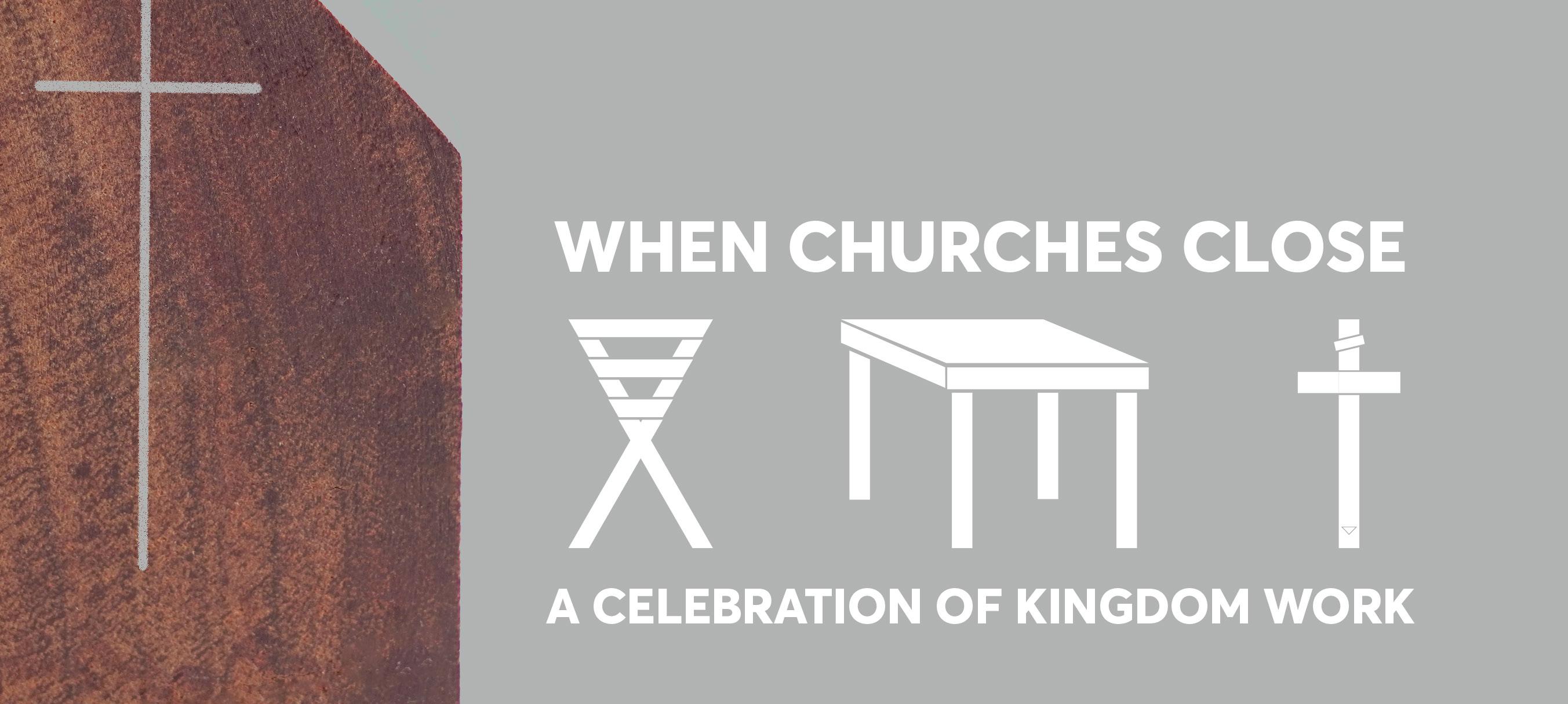 REV. PHILIP A. GUNTHER
REV. PHILIP A. GUNTHER
hree common seeds wondered about their life and purpose. Many were their thoughts about the future and their part in it. One day, the seeds came to rest on the soil and eventually became buried in the dark, cool earth. Each wondered and worried about life in such a space. Was this their purpose and future? Soon, moisture reached them. They began to sprout roots which wormed their way deeper into the soil and a stem which worked its way up and out of the earth.
TIn a short span of time, these three seeds became saplings—small and frail. Each wondered and worried about life in such a vulnerable state. Was this their purpose and future? Years passed, and these three saplings became large, strong and mature trees. They basked in the sun, rain and wind. They became shelters for animals and people. Each tree enjoyed life in such a space, but all still wondered: was this their purpose and future?
The day was ordinary in every way except one— they were cut down and moved away; each now called lumber and placed into workshops. Each grieved their lost space in the forest and anxiously worried about life in this strange place. What was to be their purpose and future?
Over time, one was crafted into a feeding trough for animals and called a manger, one was fashioned into a piece of furniture and called a table, and one was chiselled into an instrument of death and called a cross. Each was placed in a particular setting. What possibly could their purpose and future be, they wondered?
Time passed. As if by design, the manger became the bed for the Messiah, the table became the place where the Messiah’s Last Supper was celebrated, and the cross was where the Messiah was lifted up for the saving of humankind.
No longer did the three seeds, then saplings, then trees, then lumber and then crafted objects wonder about their purpose and future. For 2,000 years the manger, table and cross have been symbols to encourage and inspire countless Christians.
In God’s perfect economy, what we feel (and often fear) to be an ending is actually a beginning. Because born again is his promise.
Though churches may close, we remember how these faith communities:
˚ lifted up worship to Almighty God,
˚ declared Jesus as King of kings, Lord and Saviour,
˚ sought the guidance and renewal of the Holy Spirit,
˚ proclaimed the gospel,
˚ were obedient to the commands of Scripture,
˚ sought to fulfill the Great Commission,
˚ practiced the Great Commandment,
˚ prayed for God’s will to be done in and through them,
˚ served the community and,
˚ lived in fellowship and friendship.
A building will close its doors; a physical structure will complete its purpose for this time.
However, not one of the 10 acts of kingdom activities I listed needs to end. The King has not
20 APRIL | MAY 2024 MBHERALD.COM
released this faith community from kingdom work. He has only released its members from an attachment to a meeting house. He has opened the door for them to be light and salt in a different form. And so, go from here not asking, “Why did THIS happen to us, Lord?” but rather “What are you calling us to, now?”
For those who now find themselves former members of a church—I counsel you not to bear shame, guilt or regret. For this would not be from
our Heavenly Father. Take heart in the truth that you acted faithfully and sacrificially to be ambassadors of the gospel.
Sisters and brothers, go from here poised for the ongoing mission of the Master. And, wherever God calls you to be on mission, like the three seeds that became a manger, a table and a cross—symbols of great encouragement and inspiration—go and be likewise.
Our loving Father in heaven, blessed be your name.
All glory, honour, and praise be yours, for you alone are worthy.
In you we live and move and have our being.
All that we are and all that we are stewards of comes from your hand. Thank you for the history and work of your church.
Thank you for the witness of this faith community to its neighbours and beyond.
Thank you for the spiritual ripples that continue to go out from the work of this congregation.
Thank you for those who served faithfully and sacrificed deeply. Thank you for those who, in this place, came to faith and those who matured in faith.
Thank you for this beautiful house of worship and the fellowship, friendship and joy that was experienced here.
Thank you for the Sunday school times, Sunday services, mid-week Bible studies, prayer meetings, Christmas pageants, potlucks, child dedications and baptisms that took place within these walls.
Shepherd, lead now the last of your faithful who have called this place home; lead them from this place to a new work.
May your love and grace be their bulwark, never failing.
“Now to him who is able to keep you from stumbling and to present you blameless before the presence of his glory with great joy, to the only God, our Savior, through Jesus Christ our Lord, be glory, majesty, dominion, and authority, before all time and now and forever. Amen.” Jude 24-25
May God bless you, and as you go, continue to make you a blessing to others. Amen.
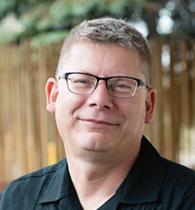 REV. PHILIP A GUNTHER is director of ministry for the Saskatchewan Conference of MB Churches
REV. PHILIP A GUNTHER is director of ministry for the Saskatchewan Conference of MB Churches
21 MENNONITE BRETHREN HERALD APRIL | MAY 2024

Open hands, open doors
Ministry to migrant farm workers at Cornerstone Community Church in Niagara-on-the-Lake, Ontario
BY LEANNE JANZEN
“What has God given us? What can he do with what we have?”
Cornerstone Community Church in Niagara-on-the-Lake, Ontario found itself asking these questions in 2017. The church had recently merged with Orchard Park Bible Church, another MB church in the community, and they now had two buildings. One facility is nestled in the countryside between Virgil and Old Town, and the other is on the main road in the heart of downtown Virgil. (For those not familiar with the area, Virgil is just west of Niagara-on-the-Lake.)
Since the Orchard Park facility was much larger, it was decided to move Cornerstone’s Sunday morning worship services there. But the church questioned and prayed and processed together: should they keep their old building in downtown Virgil, or should they sell it?
Jeff Martens is the Outreach Pastor and Director of Operations at
Cornerstone. He says that through much conversation and prayer, the church felt that God had given them the best spot in town to do ministry—the building is visible, it’s in the heart of the community, and people are already there.
So they decided to keep the old building. But now the question was: what should they do with it?
An open door
At the same time, Quest Community Health Centre in St. Catharines was looking for a better clinic space to provide healthcare for seasonal agricultural workers in the region. They were presently located in downtown St. Catharines, which is quite out of the way for the 3,000 migrant workers who come to the Niagara-onthe-Lake region every year.
Though all migrant workers in Ontario have full access to the healthcare system, there are significant barriers to this access: limited time off, transportation issues,
language barriers as well as fear of disclosing medical issues to an employer. Healthcare that is tailored to address some of these barriers is essential in creating a vibrant, healthy community and workforce.
In a different part of Niagara, Southridge Community Church was engaging with migrant workers in Vineland, occasionally operating a health clinic out of one of its buildings. So the leadership and congregation at Cornerstone thought it made a lot of sense to do something similar through their space in Virgil, since it’s a central location for migrant workers. There are many members of the church who are farmers and who are aware of the needs of the community; there is a real heart in the congregation for serving this group of people.
So, Cornerstone Community Church approached Quest about partnering together to create a community health clinic for seasonal agricultural workers through their
22 APRIL | MAY 2024 MBHERALD.COM

building in Virgil. Quest had access to the funding necessary for the medical equipment and licensing requirements, but Cornerstone was a major factor in recruiting doctors, nurses, nurse practitioners, administrative volunteers as well as volunteer translators. It also renovated their building in Virgil and set it up as a clinic space. The health clinic launched in 2019. The partnership has been wonderful for both Quest and Cornerstone; Martens says that the partnership itself has become part of the ministry.
The health clinic runs from April to October, twice a month on Sunday evenings. In 2023, the clinic served 241 individuals in total. The actual number of appointments is higher, as this includes follow-up consultations and repeat visits.
“It’s a… justice issue, for the church to stand with those that are vulnerable in our community. And I would say [migrant workers are] a vulnerable part of our community: being in a foreign country, heavily dependent on their employer, in a
system that is honestly hard, dealing with the healthcare system that most Ontarians have a hard time navigating,” says Martens. “It felt right, for us at the church, in bringing Kingdom values into that space.”
Another open door
Cornerstone has continued to ask the questions, “What has God given us? What can he do with what we have?” And God keeps providing opportunities for ministry.
In 2021, a non-profit organization called the Farmworker Hub opened in Niagara-on-the-Lake to provide clothing and other basic needs items to migrant workers—in essence, a free thrift store. It has grown substantially since it started; last season it saw over 3,000 people access its services.
Cornerstone has been in conversation with the Farmworker Hub this past year, and in 2024, it will be taking over this organization. Cornerstone’s vision for the Virgil property is that it will be the place to receive support services for
migrant farm workers in Niagaraon-the-Lake. The health clinic and the thrift store will be a ministry of their Virgil property, serving as a resource centre. Cornerstone hopes to start ESL classes and other community events that create more opportunities to build relationships between church members and their neighbours, migrant workers.
“Many [migrant workers] feel a tremendous amount of loneliness when they’re here. And so…our longer-term goal is to be more integrated [with our church]. So we’re thinking about how to have translation options available so that our gathering on Sunday is a bit more reflective of our community. And many [migrant workers] are Christians, so there’s an opportunity for them to be incorporated as part of our community when they’re here,” Martens says.
The church hopes to receive funding that would allow them to hire a part-time director of The Hub as well as a bus that could provide some transportation to events and classes—most workers travel by bicycle, which can be dangerous at night.
Martens says the vision is big. There’s a lot of work ahead to communicate this vision to their congregation and to the community. But Cornerstone has seen God’s hand throughout the last number of years, especially through the partnership with Quest and now with the Farmworker Hub.
“Through everything that God has given us…we just keep saying, ‘OK, God. You have given this to us.’ So we will keep walking forward in faith” says Martens.
LEANNE JANZEN
lives in Saskatoon, SK and is a member of Faith River Christian Fellowship.
23 MENNONITE BRETHREN HERALD APRIL | MAY 2024
The Farmworker Hub provides health and basic needs support services for migrant farm workers in the Niagara region. Bicycles are the main form of transportation for most workers.
A Blessing
BY FRIEDA KLIPPENSTEIN
Monitor bleeting
Sleepwalking, feeding
Baby calling, yawning, needing
Sleepy eyes lock, time stops
Wonder swelling, joy gelling.
Be still and sleep, my child
The Lord bless you and keep you....
Growth charts, lists of firsts
Bathtimes, solids, temper bursts
Mother Goose, Dr Seuss
Second tooth, favorite bears
“How they’ve grown!” and climbing stairs
Days are full and flying fast
Hardly notice all the lasts.
First day backpack, bulging full
Mornings marked by push and pull
Tags cut, labels stuck
Lists checked, hair slicked
Breakfast standing, lunch bags handing Wave and picture at the door.
Be kind, be good my growing one
The Lord cause his face to shine upon you....
Science projects, pots of beans
Piano practice, torn jeans
Cabin, lake, birthday cake
Stars on chore lists, running late
Meet the teacher, learn to skate
Love you, Mom! and gotta run.
Swim lessons, climbing tree
Braces, youth group, wait and see
Egg hunt at Grandma’s, be there by three
Screen time, past nine, online, just fine, you’re not the boss of me.
Clean your room, I’m on the phone
Business trips, you’re home alone
Friend drama, false starts
Slammed doors, broken hearts
Words and tears and supper rush
Sunday night stress, so out of touch!
Achievement commanding
Perfection demanding Dropping balls and missing marks.

Be patient, be still my struggling one May the Lord turn his face towards you....
German exchange trip, dance night treats Parallel park practice, walks in the leaves Tournament weekends, four in a room Dairy Queen dinners, you’re MVP! Scholarship forms, get them in soon University entrance, the deadlines loom Time that jammed, now suddenly flows Grad clothes shopping, letting go.
Be still, be wise my grown-up one God be gracious, God give peace.
It’s quiet now, the calendar clear No summer holidays, no school year No chance for do overs, resolutions, regrets What will they remember? What, thankfully, forget?
You hoped all would be perfect, all would be fun You were just getting started But now you’re done.
Be still, walk on my beloved one Mother, father, daughter, son Keep hope alive and love in place May God bless you and keep you, Shine his face.
FRIEDA KLIPPENSTEIN and her husband Norman attend the Niverville Community Fellowship in Niverville, Manitoba. She recently became a grandparent, an event that inspired this reflection.
ART BY CARSON SAMSON
24 APRIL | MAY 2024 MBHERALD.COM
MB Church Legacy Accounts
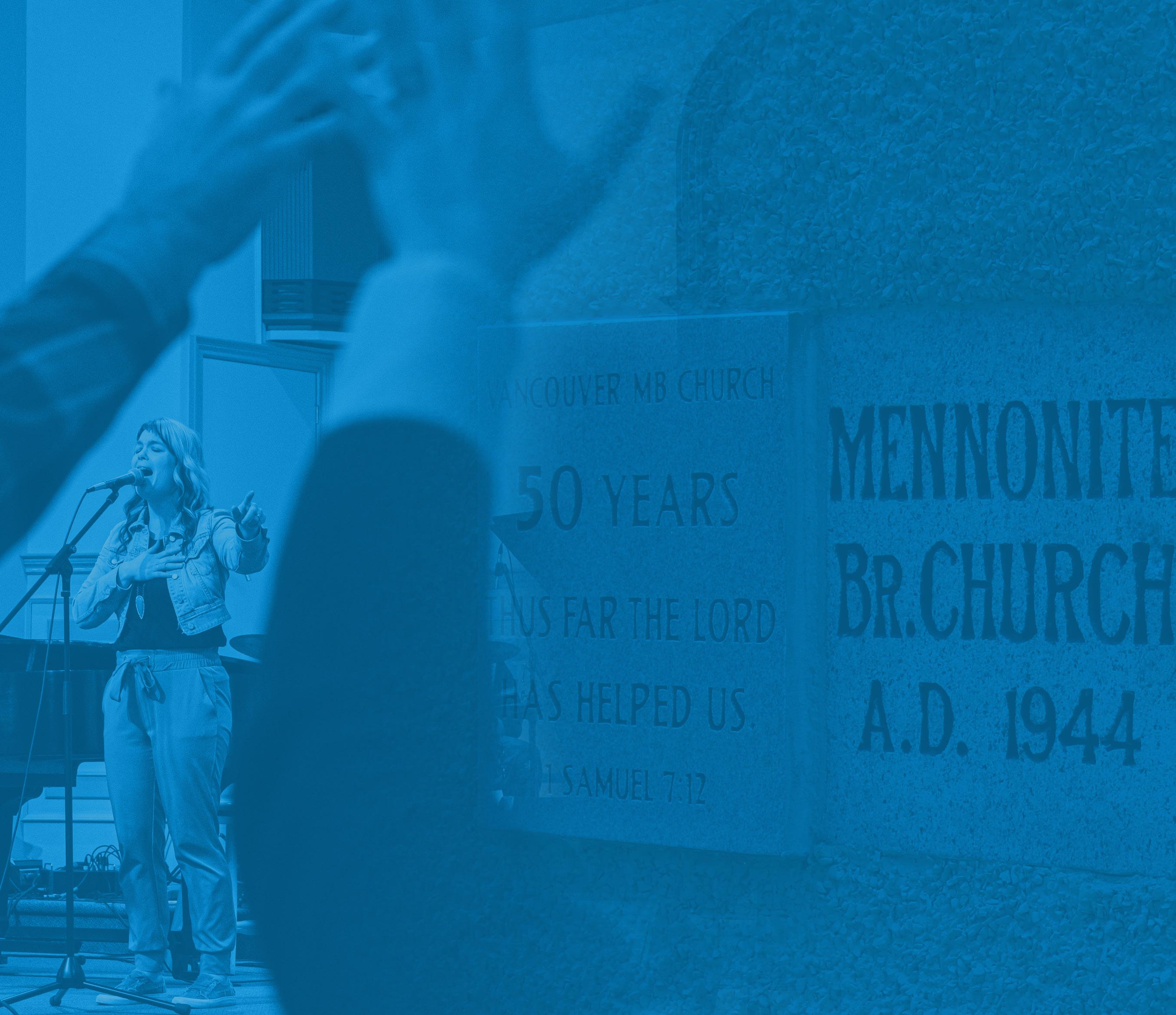
Is your church:
✓ looking to set aside unused operating funds until they are needed?
✓ saving for a building or renovation project?
✓ seeking to hold restricted funds?
With CCMBC Legacy Fund, your MB church or MB organization can open an investment account with competitive interest rates. Our accounts are not locked-in, with no terms or fees included.
1-888-669-6575 legacy@mbchurches.ca
5.0%*
You
now earn Get started today! on your MB Church Legacy account *per annum. Rate in effect January 1, 2024 to June 30, 2024. Subject to change.
can
Faith and Finance

LIVING GENEROUSLY: A CALL TO TRULY LIVE
BY CCMBC LEGACY FUND
Giving. It can be challenging to talk about in the church.
For one, many pastors feel uncomfortable preaching on the subject—they are acutely aware of their position as beneficiaries. Talking about the importance of giving or tithing means asking congregation members to fund the ministries of the church and, therefore, their salary. It’s the awkward reality of ministry.
Plus, money is just plain difficult to talk about. And this is especially true for Christians. Pride and legalism can easily creep in when we start getting into specifics, such as how much we should give, where we should give and how often we should give.
But the fact is, Jesus talked about money often. In Matthew 6:19-21, he said to his disciples: “Do not store up for yourselves treasures on earth, where moths and vermin destroy, and where thieves break in and steal. But store up for yourselves treasures in heaven, where moths and vermin do not destroy, and where thieves do not break in and steal. For where your treasure is, there your heart will be also.”
Giving generously is a discipline that not only breaks the chains of greed and consumerism within us, it is also an eternal investment. Giving involves us in the work of God around the world. People’s lives are changed by our investments in kingdom work.
So tithing is both a privilege and a responsibility. It is a witness to the reality of our faith—it clashes
with our cultural worldview that says, “Me first!” in all areas of life.
In the Old Testament, the Israelites are told to give a portion of their firstfruits, or their first harvest crop, to God (Leviticus 23:9-14, Leviticus 27:30, Proverbs 3:9-10). By doing this, the people showed their obedience and reverence for God. It also signified that they trusted God to provide enough food to feed their families with the remaining harvest.1
This is completely counter to our cultural financial priorities; our culture says we should take care of ourselves and our lifestyle first. Then, we should repay debt, and after that, we should save and invest for the future. If there’s anything left, only then should we give. Giving is the very last priority.
But what the Bible teaches is the total opposite; God tells Moses in Leviticus to make giving to the Lord the first priority. Jesus reinforces this principle in Mark 12:41-43:
“Jesus sat down opposite the place where the offerings were put and watched the crowd putting their money into the temple treasury. Many rich people threw in large amounts. But a poor widow came and put in two very small copper coins, worth only a few cents.
Calling his disciples to him, Jesus said, ‘Truly I tell you, this poor widow has put more into the treasury than all the others. They all gave out of their wealth; but she, out of her poverty, put in everything— all she had to live on.’”
26 APRIL | MAY 2024 MBHERALD.COM
LIFE THAT IS TRULY LIFE CAN ONLY BE FOUND IN GOD. HE IS OUR TREASURE; BY GIVING CHEERFULLY AND GENEROUSLY, WE REORIENT OUR PERSPECTIVE AWAY FROM OURSELVES AND TOWARDS THE LORD AND HIS WORK.
So how much should we give? For those who love living in the black and white, unfortunately there’s no rule about tithing made explicit in the New Testament. Tithing was part of the old covenant through the Law of Moses that has been fulfilled by Christ; believers are no longer bound by this law (Rom 7:1-6 , Eph 2:15, Col 2:14).
What we do have is this guideline from Paul in 2 Corinthians 9:7: “Each of you should give what you have decided in your heart to give, not reluctantly or under compulsion, for God loves a cheerful giver.” Giving is all about the attitude of our hearts. It’s living out this reality: because God has blessed us, we can bless others. Everything we have is the Lord’s to steward
In 1 Corinthians 16:2, Paul gives a few more instructions on giving to the church. He says our gifts should be in proportion to our income, and that giving should be a regular and methodical practice of individuals belonging to the church.
The other question is this: where should we give? When Jesus sent his disciples out on their own to do ministry, he told them not to bring any money or extra provisions (Matt 10:9-10, Luke 10:7) as they were to rely on the generosity of others. Paul also highlights the importance of supporting ministers of the gospel (1 Cor 9:6-14; 1 Tim 5:17-18). We are commanded to give
to those who preach the good news of Jesus so their work can continue.
Paul also tells us to give to those in need, so there is equality and that everyone’s needs can be met (2 Cor 8-9). The act of giving to others is important: wealth can so easily become an idol in our lives, leading us to put our hope in money and abandon the Lord.
Paul in 1 Timothy 6:17-19 writes, “Command those who are rich in this present world not to be arrogant nor to put their hope in wealth, which is so uncertain, but to put their hope in God, who richly provides us with everything for our enjoyment. Command them to do good, to be rich in good deeds, and to be generous and willing to share. In this way they will lay up treasure for themselves as a firm foundation for the coming age, so that they may take hold of the life that is truly life.”
Life that is truly life can only be found in God. He is our treasure; by giving cheerfully and generously, we reorient our perspective away from ourselves and towards the Lord and his work. Because of Jesus, there’s no absolute rule for Christians about giving. But the fact remains: being generous is a beautiful gift that helps us remember that everything belongs to God— not just our finances, but our very lives. It’s also a great privilege to partner with others who are spreading the good news of Jesus in our communities and around the world.
For many of us, we may need to ask ourselves: what has priority in our lives? Are we giving generously and sacrificially? Are we being obedient in supporting the Lord’s work in our churches, missions organizations, schools, camps and other areas where the gospel is being preached? Are we living a life that is truly life?
CCMBC LEGACY FUND exists to provide ministry-focused financial services to facilitate Kingdom Growth. For more information, visit ccmbclegacyfund.com
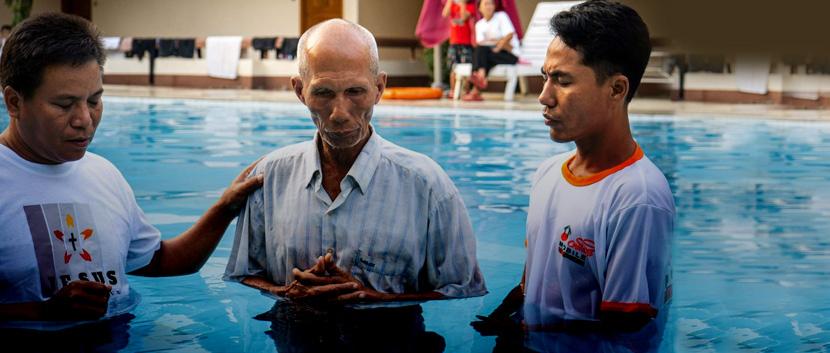


27 MENNONITE BRETHREN HERALD APRIL | MAY 2024
S E E O UR GLOBAL M ISSIONREPO R T - multiply.net/reporttogether that the world may know Jesus How do we work together on God’s Mission?
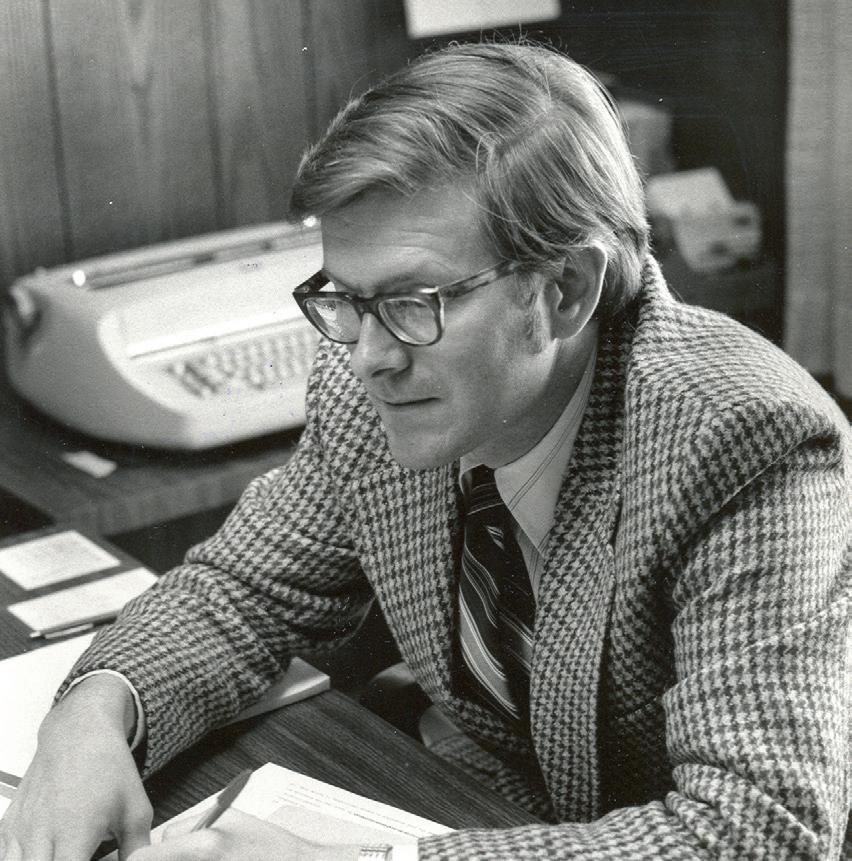
Harold Jantz
JANUARY 8, 1937-FEBRUARY 7, 2024
Prolific writer, editor and publisher Harold Jantz passed away peacefully with his daughter Ruth at his side on the evening of February 7, 2024, after an illness of several months.
Harold was born in Laird, Saskatchewan to Henry and Lena Jantz, who had immigrated from Russia to Canada in the 1920s. He enjoyed his early years on the family farm with his six siblings. When Harold was ten the family moved to a fruit farm in Virgil, Ontario. He married Neoma Hinz, whom he met during studies at MBBC in Winnipeg, and they enjoyed 62 years together. After spending three years teaching in Virgil, they settled in Winnipeg where they raised their three daughters, Connie, Linda, and Ruth.
Harold was the editor of the MB Herald conference magazine for two decades and was the founding publisher/editor of ChristianWeek , a national evangelical newspaper, which he led for a decade. In addition, he contributed frequently to other publications including the Winnipeg Free Press. He always sought to cultivate respectful
debate. Throughout his life, Harold enjoyed working within his own Mennonite Brethren local church and wider conference, where he assumed many roles and served on numerous boards and committees.
One of the more challenging projects Harold undertook was the responsibility for a national Faith and Media conference held at Ottawa’s Carleton University in 1996. It brought together several hundred media personalities and representatives of all of Canada’s faith communities. Its intent was to help Canadian media appreciate how the faith of believers affects or directs their actions. It was also an exercise in creating a civic culture of acceptance of one another.
Harold and Neoma travelled extensively, often with daughters in tow. Harold enjoyed these adventures. One memorable year, while on a sabbatical from editorial tasks, he took his young family on an overland trip from Canada to Paraguay, a 22,000 km trek in a VW van! It left lifelong memories for all. Harold was not one to sit idle very often, but when he did have spare time, he liked to play
scrabble with his daughters, golf, and birdwatching.
Above all, his desire was always to serve his master and Lord, Jesus Christ. He saw himself as writing out of his own convictions and beliefs and on behalf of those who might share his beliefs. He did not write for those who might not share his beliefs. Others could do that. His was a deeply orthodox, evangelical Christianity, rooted in the historic creeds of the church. When he contracted his final illness, he felt no sadness, only a profound gratitude for the arc of his life and the opportunities God had given him.
Harold is survived by his wife Neoma; daughters, Connie, Linda (granddaughter Amber), and Ruth (partner Steve Salnikowski); sister Marlene Derksen, and many in-laws, nieces, and nephews.
Donations in memory of Harold will be welcomed to Mennonite Brethren Seminary or Square One World Media
Here is a recent video and published interview with Harold.
28 APRIL | MAY 2024 MBHERALD.COM

Timothy Jonathon Peter Wiebe
APRIL 17, 1980-FEBRUARY 9, 2024
Timothy Jonathon Peter Wiebe died at Health Sciences Centre in Winnipeg in the early hours of February 9, 2024, after a 131-day hospitalization. Tim was born Apr. 17, 1980, a beautiful day in a year when there was an early spring and the snow had already disappeared. His birth brought such joy that his dad spent the next day working off the adrenaline high by raking the half acre lawn on our property on Pritchard Farm Road before it was even time to visit the hospital. This place was Tim’s home for the first 12 years of his life, and he had a happy childhood there playing with the boys next door and his sister Leslie.
Timmy, as he was known in his younger years, attended Tante Laura’s preschool at North Kildonan Mennonite Brethren Church and then moved on to the German bilingual program at Princess Margaret School for his elementary school education. Athletics were his primary interest from an early age; he was kicking a ball shortly after he learned to walk. He excelled at soccer and baseball at the East St. Paul Community Centre, despite always being the smallest player on the team. In the winter months, he enjoyed bowling for several years. Tim sang in the
Mennonite Children’s choir for 2 years and travelled to New York to sing at Carnegie Hall with this group when he was 9 years old. A wonderful summer was spent in Yellowknife, N.W.T., in 1991, and Tim’s love of tennis was solidified here as he spent many hours on the courts. He attended Valley Gardens Community Church with his family; many of his childhood friends came through this connection.
Our move to Abbotsford, B.C., occurred when he was 12 in 1992. Tim attended the Clayburn Campus of Abbotsford Christian School for seventh grade, and this is where he was first dubbed with the nickname Teemu, as he remained a fan of the Winnipeg Jets, for the duration of the 9 years that we lived there. His high school years were spent at Mennonite Educational Institute; floor hockey became his passion during his time in high school. He attended youth group at Mountain Park Community Church and continued to play baseball in the summers. During this time, there were frequent trips back to Manitoba to see grandparents and extended family, visits to Seattle to watch the Mariners, and vacations in Hawaii, Phoenix, San Diego, and Oregon. Many
weekends were spent exploring the Lower Mainland, with White Rock, Stanley Park, and the hiking trails of the North Shore mountains being some of our favourite destinations.
High school graduation brought challenges for Tim, and he felt a little adrift, uncertain of what direction to take in life. He spent a year at the local community college in Abbotsford and worked a variety of odd jobs. That summer, he and his friend Mike made a road trip across Canada in Tim’s Honda Civic, a trip that culminated in Montreal.
Tim settled in at Steinbach Bible College back in Manitoba in the fall of 1999. He enjoyed dorm life, and lasting friendships were formed there. This was also where Tim first sustained a knee injury while playing soccer which developed into an inflammatory arthritis.
The fall of 2001 saw our family move back to Winnipeg, and Tim completed his final year of Bible school in Steinbach as a commuter. He subsequently did a year at Red River Community College in the business administration program, then worked for his dad in their accounting business in Carman for a number of years. In 2007, shortly before his diagnosis of Hodgkin’s
29 MENNONITE BRETHREN HERALD APRIL | MAY 2024
lymphoma, he found his work home in the accounting department of the Canadian Conference of Mennonite Brethren Churches. Tim loved the people he worked with there and remained a loyal employee until his cancer relapse and stem cell transplant in 2020.
Tim’s progressive, debilitating arthritis, which included a hip replacement in 2011, gradually took away his ability to actively participate in the sports he loved, but he remained an avid fan of the Jets, the Bombers, and the Seattle Seahawks, as well as various Canadian tennis players. For him, the highlight of holidays in Palm Springs was his attendance at the Indian Wells tennis tournament.
Tim was also a long-time member of a fantasy football league. He
enjoyed old sitcoms and was an unapologetic devotee of Mr. Bean. He loved the band Collective Soul and followed them to concerts across the country.
Tim accepted Jesus as his personal Saviour at an early age and later recommitted his life to God at a youth rally in B.C. After an episode of septic shock during chemotherapy in 2008 put him in the ICU, he felt convicted of his need for baptism, and on his birthday in 2011, he was baptized by his friend and work colleague Robert Bell at The Meeting Place. He attended the young adults group at this church, and he remained a faithful online attender during the pandemic and during his most recent hospitalization.
Tim fought a valiant battle for
Finish lines
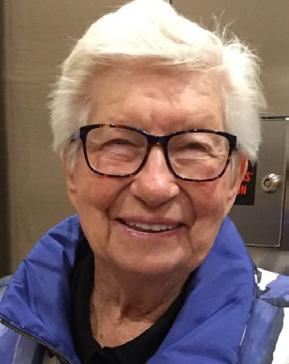
ELSIE ELIZABETH STOBBE
Elsie Elizabeth (Vogt) Stobbe died Feb. 10, 2024, at the age of 96. Predeceased by her parents, Anna and David Vogt, most of her siblings, and her loving husband of more than 50 years, Helmut, she is lovingly remembered by siblings Henry (Barb), Susan (Jimmy); children Loni (Bruce), Jacquie (John) and Andrew; grandchildren, great-grandchildren, extended family, and dear friends whom she prayed for every day. Elsie was born in Borden, Sask., where she lived with her 7 siblings until her teens. At 18, she moved to the Fraser Valley, and that first summer, she met Helmut Stobbe. After they “went together” for a few years, in their words: “We reached the stage where we wanted to be together always,” and they married Sept. 3, 1949. Elsie wore many hats in their 50+ years of marriage. After years of odd jobs that took them all over B.C. and Alberta, they bought a home in Prince George where they raised their 3 children. Together, Helmut and Elsie ran the Prince George Travelodge Motel for 9 years. They built a log cabin on Purden Lake that would become their haven for many years. Elsie was always up for an adventure. Elsie and Helmut embarked on a world tour where they visited family
many years bravely and with grace. He did not like the focus to be on his health issues, and only those closest to him were aware of the degree to which he struggled. He had issues with social anxiety, and it was only when you got to know him well that you recognized his quirky sense of humour and his kind and gentle spirit. He touched more hearts than he ever knew.
Left to cherish Tim’s memory are his parents John and Linda, his sister Leslie and her husband Scott Unger, his nephew Lukas and his niece Kenzie; as well as many extended family members and friends.
Embracing him in heaven are both sets of grandparents, Peter and Gertrude Wiebe and John and Anne Froese.
and missionaries and served organizations and people in need. This volunteering would carry on into their retirement as they joined the Roving Volunteers in Christ’s Service to travel around North America helping where needed. Helmut and Elsie were an amazing team and truly functioned as one unit. It was a new chapter for Elsie after she lost Helmut, one that would last 20 more years. Elsie embraced this new chapter head on: she volunteered, exercised, travelled, and was able to enjoy her great-grandchildren. She was an active member in her church. You would often find Elsie in the kitchen, cooking for everyone. She became famous for her pies and homemade borscht. Serving others and the Lord was her passion, something she continued throughout her life. “But those who hope in the Lord will renew their strength. They will soar on wings like eagles; they will run and not grow weary, they will walk and not be faint” (Isaiah 40:31).
Birth: August 6, 1927 Birthplace: Borden, Sask.
Death: February 10, 2024
Parents: Anna & David Vogt
Married: Helmut Stobbe, Sept. 3, 1949 [d. Dec. 12, 2004]
Family: Helmut; children Lalonie (Bruce), Jaqueline (John), Andrew; grandchildren Carly, Jessie, Robert, Stuart; greatgrandchildren Jonah, Juno, Gracie, Olive, Samuel, Freddy, Bo Church Westwood MB, Prince George, B.C.
30 APRIL | MAY 2024 MBHERALD.COM
VIOLA SCHMIDT
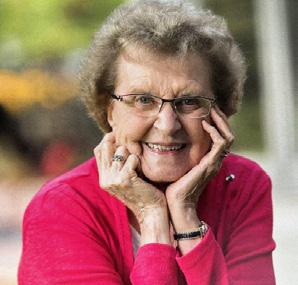
Viola Schmidt died peacefully in her sleep after a short illness at the age of 95. Viola had a long life worth celebrating. She was born on her parents’ Peter and Justina Bergman’s farm near Borden, Sask., the second of 4 girls. She recounted stories of life before electricity, going to school by sleigh, playing with her sisters, and an eventual move to the town of Hepburn where she met Alfred Schmidt. Shortly after their marriage in 1950, Vi and Alf survived a frightening car accident and devoted their lives to Christian service. They moved to Fresno, Cal., for seminary study, to Quebec and Belgium for French studies, and finally to the Congo in 1959 to be teachers with Mennonite Brethren Missions and Services. Despite having to flee dangerous rebellions in the first years, Alf and Vi persevered with their work in the Congo. Vi had 4 children and taught women’s classes in subjects ranging from literacy to home economics, spending nearly 20 years in the Congo. Along the way she came to speak 5 languages. Vi and Alf returned in the mid-1980s to to Regina, where Vi worked for SaskPower. In retirement, she moved to Abbotsford and then Tsawwassen, B.C., to be near her children. Vi was a dedicated member at Cedar Park Church in Ladner. She loved music and sang in the Delta Community Choir. She volunteered at the local thrift store as well as Tsawwassen flu shot and baby clinics. In her retirement, she also wrote a biography of her younger sister Alvina, a nurse who died as a young mother from breast cancer. In her final years, Vi loved her friendships at St. David’s Seniors House. To her friends and family, she was always positive and encouraging. Vi was predeceased by her husband Alfred and 3 sisters Esther, Helen, and Alvina.
Birth: November 20, 1928
Death: February 8, 2024
Birthplace: Borden, Sask.
Parents: Peter & Justina Bergman
Married: Alfred (Alf) Schmidt, 1950 [d. December 2009]
Family: children Rodney (Omaira), Karin (Art), Randy (Kim), Valerie (Randy); grandchildren Jessica, Stefan, Karalee, Aaron, Angela, Kelley, Chloe, Nicola; in-laws Josie Ens, Wilmer Fast, Wes Schmidt, Ed Schmidt; nephews & nieces
Church: Cedar Park, Ladner B.C.
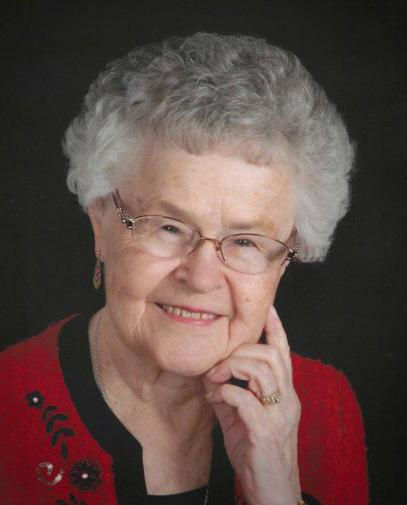
ANNE MIRIAM FRIESEN
Anne Friesen was born to Susanna Schultz and David P. Schultz on Jan. 18, 1923, in Marion, South Dakota. She received Jesus as her personal Saviour at age 9 and was baptized 2 years later in the Vermillion River near Dolton, S.D. In 1940, her family moved to Oregon, where her father became the pastor of Dallas MB Church. After her senior year of high school in Dallas, Anne attended the Bible Institute of Los Angeles (Biola) where she became a Christian education major. While in school, she also sang in the Biola Radio Choir, travelled to local churches to give her personal testimony and to sing, and worked in various jobs to pay the expenses of her education and service. In 1945, Anne married John E. Friesen. In 2003, Anne wrote, “Both John and I had individually heard the call to ministry. Together, we obeyed that call.” At the end of the summer in 1945, she returned to Biola to finish her degree while John was required to continue working in Civilian Public Service as a conscientious objector to war. In 1946, Anne completed her studies, John was released from CPS, and they began a 9-year period of ministry in Portland and Los Angeles while John attended Multnomah School of the Bible and Fuller Theological Seminary. After he finished those programs, they served in California MB churches in Dinuba, Bakersfield, Lodi, and Arleta, and in Chilliwack and Dawson Creek in B.C. About those years Anne wrote, “I found joy in my role as helper and support to John in our pastorates in different ways, sometimes going along making visitations, often entertaining guests in our home, and sharing in the ministry of prayer.” In retirement, Anne was active in the Willow Creek Homeowners’ Association (Fresno) and, after John’s death in 2009, she moved to Palm Village Retirement Community in Reedley, Cal., where she died on Mar. 21, 2024.
Birth: January 18, 1923
Birthplace: Marion, S.D.
Death: March 21, 2024
Parents: David & Susanna Schultz
Married: John E. Friesen, 1945 [d. July 2009]
Family: children James (Maureen), Steven (Janice), Lois (Fredric); grandchildren Eric (Erin), Peter (Cassie), David (Mary), Daniel, Josh, Joy (William); great-grandchildren Noel, Aster, Lumen, Miriam, Roxy, Reuben, Jack, Tommy; sister June (Gene) Church: North Fresno (Cal.) MB
31 MENNONITE BRETHREN HERALD APRIL | MAY 2024
Finish lines
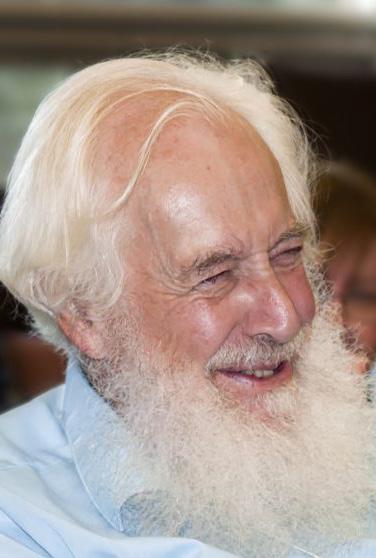
VERNON HERMAN RATZLAFF
Vern was born near Waldheim, Sask., where he helped run the farm as his father’s health failed. At 15, Vern and his parents joined his older siblings in Delta, B.C. There, during Vern’s Grade 13, his father died. To help his mother, Vern began work as a meteorological technician with the B.C. Department of Transport (1956–62). At University of B.C., he completed a BSc Honours degree in Physics & Math, BA in English & History, BSW (Social Work), an MA in Political Philosophy, and theology coursework at United Church Seminary. After marrying Helen in 1958, Vern taught at Sharon Mennonite Collegiate, Yarrow, B.C. (1962–66). In 1966, Vern and Helen settled in Winnipeg, where their family grew to 5 children and many foster children. Vern taught philosophy and religious studies at MB Bible College and U of W, from 1966–76, continuing part-time until 1982. Meanwhile, he assumed full-time duties as executive director of Mennonite Central Committee Manitoba (1977–82). He was instrumental in the formation of Canadian Foodgrains Bank. Vern became director of MCC Egypt (1982–87), taking their two youngest children along to Cairo. His interfaith contributions involved Muslim, Christian, urban, and rural communities in development, healthcare, and education. Vern pastored Nutana Park Mennonite Church, Saskatoon (1987–2005), and spoke regularly on the Abundant Life radio broadcast (1988–2003). After pastoring part-time at Aberdeen (Sask.) Mennonite Church (2006–2018), Vern
continued as congregant. Vern was founding chair (1989–99) of the Spiritual Care Advisory Committee to the Saskatoon Regional Health Board, a member of the Ethics Committee of the Regional Health Board, and a Bioethics instructor in the College of Medicine, University of Saskatchewan. From 2007–2021, Vern served Lutheran Theological Seminary, Saskatoon; they granted him an Honorary Doctor of Divinity in 2011. Vern enjoyed singing in choirs, listening to classical music, attending and hosting garage sales, cheering for the Canadiens, frequenting doughnut shops, reading mysteries, being recognized as Santa Claus, and telling jokes. As a father and grandfather, he could pull off a mean wiener roast even in winter, construct custom bookshelves, build models, listen deeply, make enormous breakfasts, cultivate an incredible garden, and share awe and joy in the natural world. He demonstrated his devotion to Helen by caring for her in their home during her final years. He missed her profoundly after her death in 2014. With Philippians 2:5–8 as his model, Vern committed himself to the work of the church. He was predeceased by his siblings Matilda (Art) Unruh, Frieda (Nick) Unruh, Jack (Agnes), Sadie (Herman) Schuetze.
Birth: June 16, 1937 Birthplace: Waldheim, Sask.
Death: February 16, 2024 Parents: Jacob & Sara (Voth)
Ratzlaff Married: Helen Koehn, June 21, 1958 [d. Aug. 17, 2014]
Family: children Shirley, Patricia (Perry) Ng, Norman, Diane (Kevin) Friesen, Bruce (Darlene); grandsons Reuben, Micah (Amber) & Stephen (Molly) Ng, Samuel & Louie Friesen
Church: Elmwood MB, Winnipeg Baptism: Brotherfield MB, Sask., 1951
OBITUARIES HAVE LONG BEEN A VALUED PART OF THE MB HERALD . FROM THE FUNERAL BULLETINS, EULOGIES, AND NEWSPAPER OBITUARIES YOU SEND, OUR EDITORS CRAFT LIFE STORIES OF OUR MEMBERS TO INSPIRE AND ENCOURAGE OUR READERS, CREATING A MEMORIAL OF MB SAINTS.
CLICK HERE TO SUBMIT AN OBITUARY
THE
A moment in time
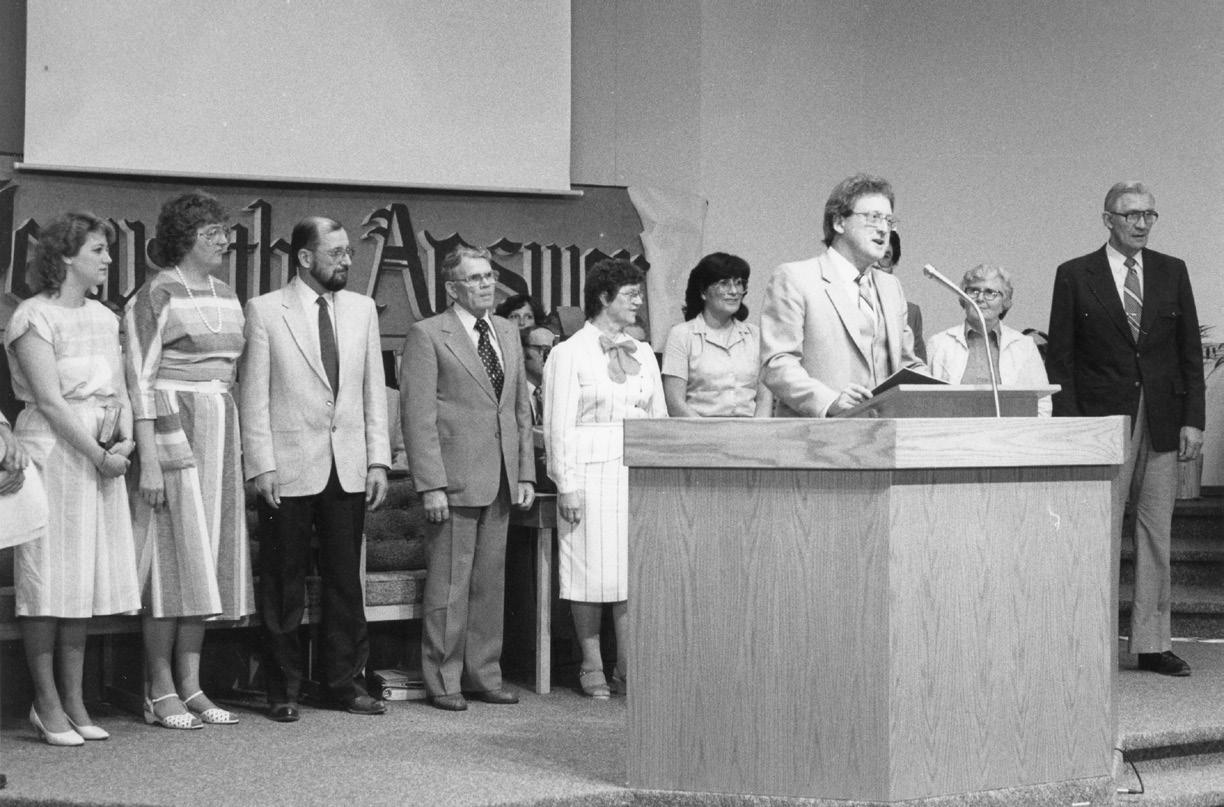
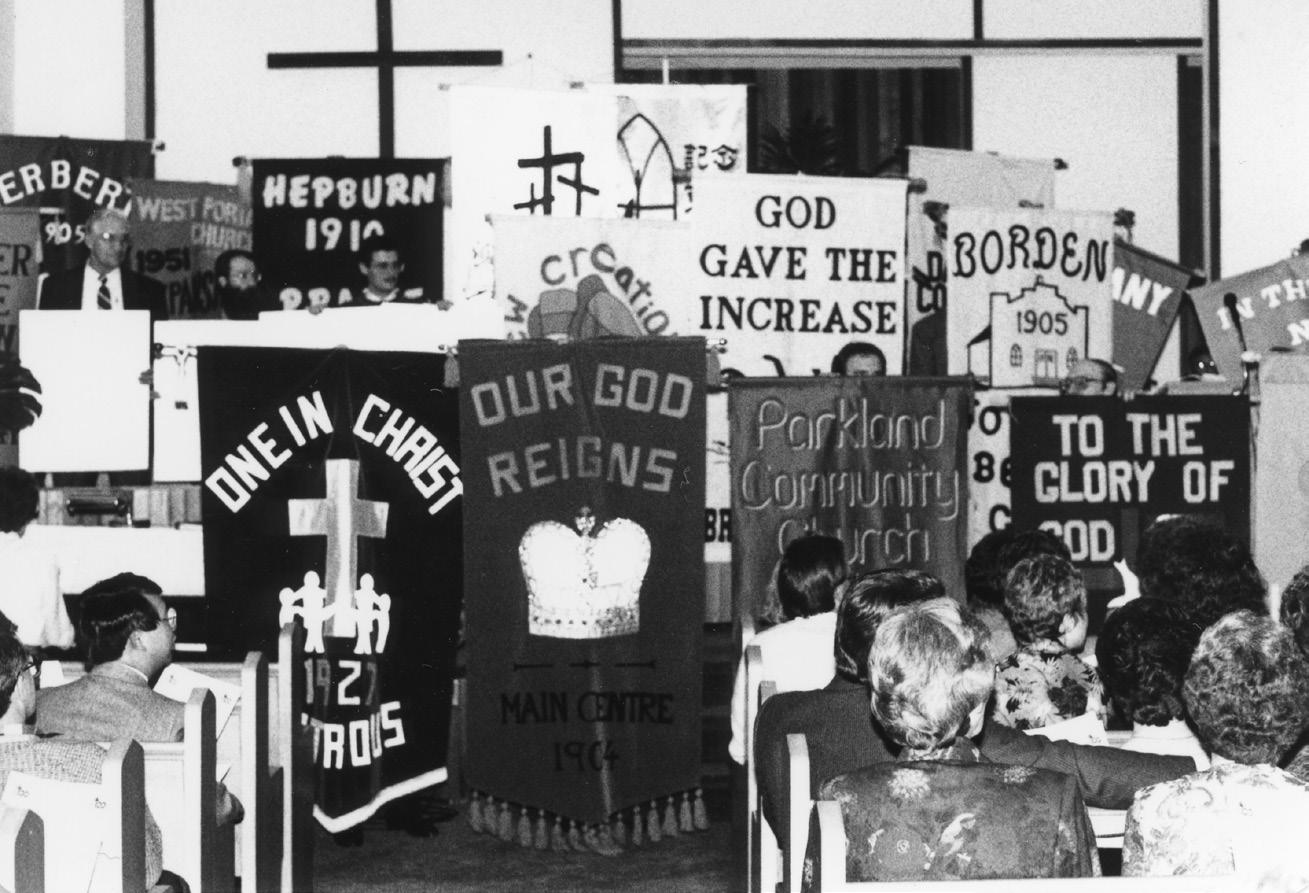 SASKATCHEWAN, 1985 (TOP) AND 1988 (BOTTOM)
John Wiens behind the pulpit, introducing new pastoral couples on stage at a Saskatchewan MB Conference convention. Walter Balzer stands at the far right.
A collection of church banners on stage at a Saskatchewan MB Conference convention.
Courtesy of the Mennonite Archival Information Database Top Image | Bottom image
SASKATCHEWAN, 1985 (TOP) AND 1988 (BOTTOM)
John Wiens behind the pulpit, introducing new pastoral couples on stage at a Saskatchewan MB Conference convention. Walter Balzer stands at the far right.
A collection of church banners on stage at a Saskatchewan MB Conference convention.
Courtesy of the Mennonite Archival Information Database Top Image | Bottom image
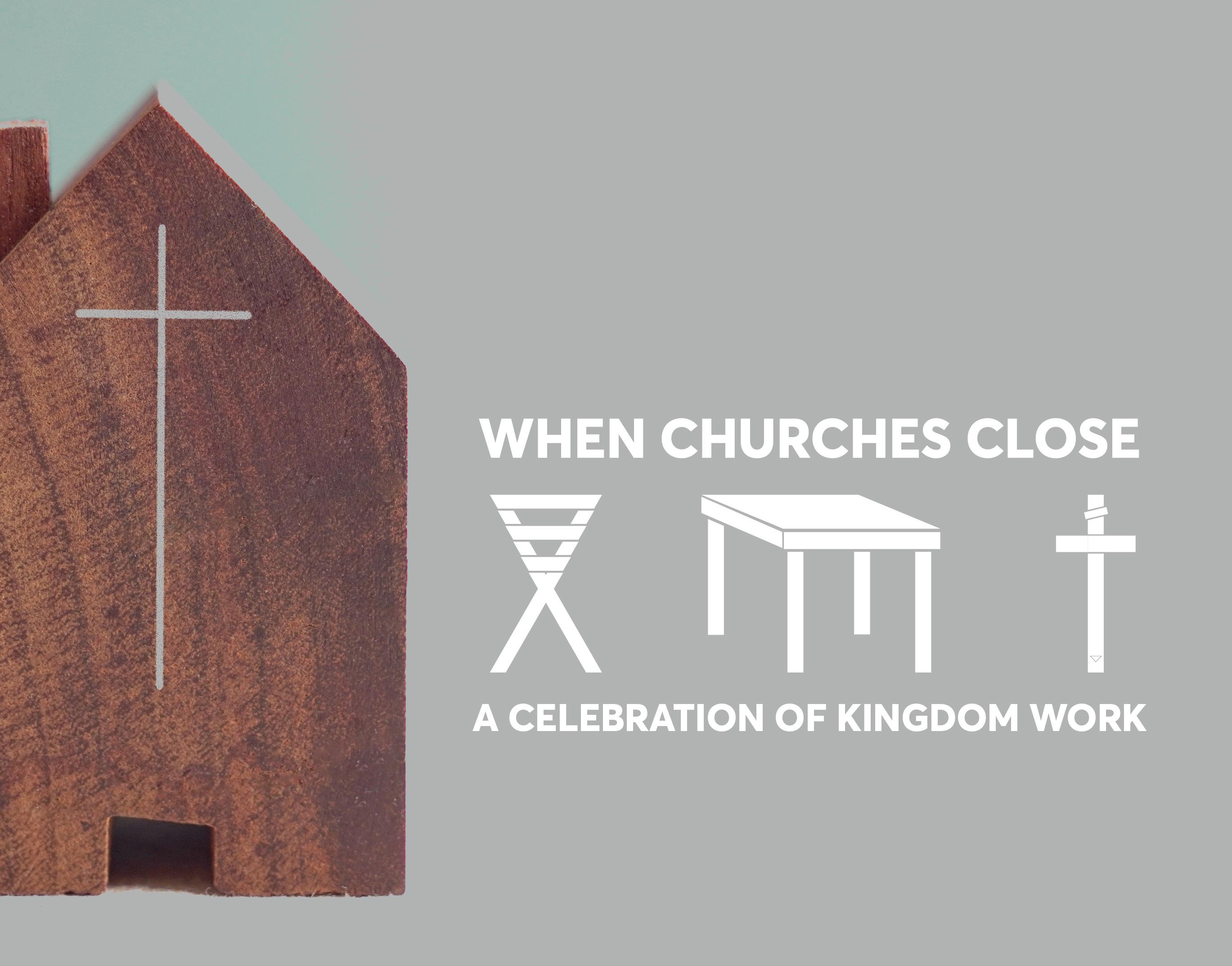
SUBSCRIBE TO MB HERALD DIGEST WWW.MBHERALD.COM/SUBSCRIBE-VIA-EMAIL













 CARSON SAMSON Communications director
CARSON SAMSON Communications director








 By Linda Espenshade
By Linda Espenshade
 REV. PHILIP A. GUNTHER
REV. PHILIP A. GUNTHER
 REV. PHILIP A GUNTHER is director of ministry for the Saskatchewan Conference of MB Churches
REV. PHILIP A GUNTHER is director of ministry for the Saskatchewan Conference of MB Churches















 SASKATCHEWAN, 1985 (TOP) AND 1988 (BOTTOM)
John Wiens behind the pulpit, introducing new pastoral couples on stage at a Saskatchewan MB Conference convention. Walter Balzer stands at the far right.
A collection of church banners on stage at a Saskatchewan MB Conference convention.
Courtesy of the Mennonite Archival Information Database Top Image | Bottom image
SASKATCHEWAN, 1985 (TOP) AND 1988 (BOTTOM)
John Wiens behind the pulpit, introducing new pastoral couples on stage at a Saskatchewan MB Conference convention. Walter Balzer stands at the far right.
A collection of church banners on stage at a Saskatchewan MB Conference convention.
Courtesy of the Mennonite Archival Information Database Top Image | Bottom image




